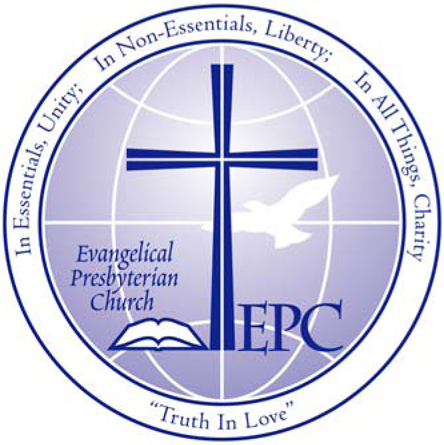 |
Devotionals for Women |  |
_______________

Time to Hurry Home
| “The name of the Lord is a strong tower; the righteous run to it and are safe.” |
| —Proverbs 18:10 |
I found myself in a suburban Conference Center in Baltimore, Maryland, on September 11, 2001. The news of the attacks shocked me to the core. Insecure and, with my husband in another part of the Conference Center teaching a seminar, I felt very alone. More than anything, I felt it was time to hurry home. On another occasion, as I drove through a blizzard, unable to see either side of the road that I knew was framed with deep ditches, I only wanted one thing: to quickly, but cautiously, press onward until I could see the familiar lights of home.
In thinking about the way we respond when faced with times of danger, or other things unknown, I remembered my experience as an Elementary School music teacher. A little Preschooler in my classroom, insecure and afraid, often cried out and declared through tears: “I wanna go ’ome!”
Spiritually speaking, when we are afraid, lost, lonely, feeling abandoned, or facing danger, where do we first long to go? Job, in Chapter 23 of the Old Testament Book that bears his name, spoke these words:
Oh, if I only knew where I might find him!
For Job, his God represented “home” to him. And, in the loving presence of God, Job knew he would find the place where he could rightly feel at home. As Psalm 91:9 tells us:
If you make the Most High your dwelling—even the Lord, who is my refuge—then no harm will befall you, no disaster will come near your tent.
When disaster threatens us, or when times of trial overwhelm us, God wants us to hide in Him and trust Him for our security. On such occasions, it is time for us to hurry home. Famous preacher, Charles Haddon Spurgeon, wrote: 1
God’s children run home when the storm comes on. It is the heaven-born instinct of a gracious soul to seek shelter from all ills beneath the wings of Jehovah. “He that hath made his refuge God,” might serve as the title of a true believer … Nothing teaches us so much the preciousness of the Creator, as when we learn the emptiness of all besides.
______________________
| 1 Spurgeon, Charles Haddon, Morning and Evening. Mclean, VA: MacDonald Publishing Co., Public Domain. p. 649. |
—Posted: Monday, November 18, 2024
_______________

Perfect Practice Makes a Perfect Performance
| “Have nothing to do with godless myths and old wives’ tales; rather, train yourself to be godly.” |
| —1 Timothy 4:7 NIV |
You’ve heard the expression, “Practice Makes Perfect.” From painful personal experience, I’ve learned that more accurately, “Perfect Practice Makes Perfect.” In fact, “Perfect Practice Makes a Perfect Performance.”
As a life-long pianist—having studied in my youth for nearly 20 years with professional teachers and having taught piano to young students myself—I know, all too well, the results of imperfect practice. My first teacher—a nurturing, patient woman who forever placed within me a love for playing the piano—did her best to give me a very solid foundation, even though she readily admitted her own inadequacies. However, I developed habits of poor technique that followed me into my college years. For example, my pinkies had to learn to stand up and I had to help them develop strength and usefulness as “leads” in the making of sonorous melodies. My college professor gave me humiliatingly boring exercises to break many of my bad habits. But, oh, the results I achieved!
Christians develop wrong habits too. Many of them come with us from our lives as unbelievers: selfish and even unaware of God’s higher standards. We may not have spread “godless myths and old wives’ tales,” as the people apparently did in Timothy’s churches. But, we may have learned, for example, to run to friends with juicy tidbits of gossip we hear. The Apostle Paul warns the believers in Colossians 3:9:
Do not lie to each other, since you have taken off your old self with its practices and have put on the new self, which is being renewed in knowledge in the image of its Creator.
The Apostle clearly realizes that a practice of lying, or stretching the truth, or deceiving another with a skewed report, can be a habit especially hard to break.
I found in playing the piano that often in practice time my mind would go on “automatic pilot.” My mind would not pay attention what I was playing. So, to break old habits and form new ones, we must first engage our focus. Secondly, we must determine to obey God through His written Word. Then, the long slow process of practice will need perseverance and patience.
How long before a new habit takes hold? Note this report from an on-line article by Signe Dean: 1
… according to a 2009 study, the time it takes to form a habit really isn’t that clear-cut. Researchers from University College London examined the new habits of 96 people over the space of 12 weeks, and found that the average time it takes for a new habit to stick is actually 66 days; furthermore, individual times varied from 18 to a whopping 254 days.
Progress in making a change in our spiritual lives will sometimes go slowly. Mistakes will occur. Yet, to attain a mature Christian life, the practice and re-practice will yield great results. In speaking about Christian maturity, the author of Hebrews writes about the need for believers to grow up from drinking only milk to eating solid food. In Hebrews 5:14, we read:
But solid food is for the mature, who by constant use have trained themselves to distinguish good from evil.
God expects us as mature—or “perfect”—disciples to give up the old ways and practice the holy disciplines and habits that will result in greater glory for Him through our lives.
______________________
| 1 Dean, Signe. Here’s How Long it Takes to Break a Habit, According to Science. www.sciencealert.com, September 24, 2015. |
—Posted: Monday, November 11, 2024
_______________

Given Into Our Hands
| “Then the Lord said to him, ‘What is that in your hand?’ ‘A staff,’ he replied.” |
| —Exodus 4:2 |
Sam Kressler played the saw. This older gentleman in my home church—a farmer, a man who loved both God and His church—didn’t have any formal musical training. Nevertheless, Sam Kressler had a handsaw and he had a desire to play music to honor the Lord.
Dorothy Anderson, a single woman in a church at which I was once a member as an adult, nurtured fabulous flower gardens. She gave her flowers a great deal of attention. She carefully and lovingly decorated the Communion Table in the church sanctuary with her blooms every week, without fail.
Catherine Winkworth, a Nineteenth Century English woman, had a particular interest in German chorales. As a personal devotional exercise, she began translating German hymns and German chorales into English. By the time she had finished her passionate labor, she had found and translated 400 hymns, including the following well-known hymns, which we cherish in our congregational singing today:
- “If Thou But Suffer God to Guide Thee”
- “Jesus, Priceless Treasure”
- “Praise to the Lord, the Almighty”
- “Now Thank We All Our God,”
The Old Testament Scripture records that Moses only had a staff to offer to the Lord. Oh, but how God used that staff of this famous patriarch! With that staff and with direction of the Lord, Moses brought about the plagues on the Egyptians, parted the Red Sea, brought water from the rock in the wilderness, and defeated the Amalekites.
Similarly, young David had a slingshot and five smooth stones. Yet God used those implements to defeat a giant—Goliath—and his mighty army.
Considering how God has used what He has provided in each of these instances, I am prompted to ask this question:
“What has God put into our hands?”
God has given each one of us something that He wants us to use for His glory. And, God will surely use the gifts He has given us, if He also has our willing hearts. We must never think that anything God has given us is too small, or too insignificant, for Him to use for His glory.
As we give ourselves to God today, let nothing seem out of reach for His mighty use. We will be surprised what He draws on for His purposes.
—Posted: Monday, November 4, 2024
_______________

A Place of Abundance
| Then Moses made Israel set out from the Red Sea, and they went into the wilderness of Shur. They went three days in the wilderness and found no water. When they came to Marah, they could not drink the water of Marah because it was bitter; therefore it was named Marah [meaning: “bitterness”]. And the people grumbled against Moses, saying, “What shall we drink?” And he cried to the Lord, and the Lord showed him a log, and he threw it into the water, and the water became sweet. There the Lord made for them a statute and a rule, and there he tested them, saying, “If you will diligently listen to the voice of the Lord your God, and do that which is right in his eyes, and give ear to his commandments and keep all his statutes, I will put none of the diseases on you that I put on the Egyptians, for I am the Lord, your healer.” Then they came to Elim, where there were twelve springs of water and seventy palm trees, and they encamped there by the water. |
| —Exodus 15:22-27 |
The whole tribe of Israel, approximately two million people strong, had left Egypt by the miraculous hand of God. They had seen God defeat their Egyptian captors who had pursued them to the Red Sea, where God parted the waters for the Israelites and drowned their enemies with those same waters.
If you read Exodus 15, you see there the victorious song they sang, led by Moses and Miriam. They had bright hopes and a marvelous future in the Promised Land ahead of them. Yet, in verse 22, the story changes when God shows His people that He intends to test them before giving them this promise.
They finally found water after three days of thirsty travel. But, at Marah they could not drink because of the bitterness. That which should have refreshed them, would only have poisoned them. God directed Moses to find a log of wood he could throw into the water to make it sweet so that they could drink. God “healed” the water.
After they had taken a drink, God shared with them His intention to test them in the wilderness. He also made a pact with them that He would “heal” them of all the diseases of Egypt if they would pay attention and obey His commands. Once He promised them this, they moved on and He brought them to an oasis in Elim of rich, verdant, lavish palm trees and springs of water.
This story reminds me of friends who have lived in the “wilderness” of their lives far longer than they could have ever imagined. The “water” they have had to drink tastes bitter and putrid. This story from Exodus reminds me to pray that God would send “healing” to these bitter waters while He assigns them to dwell in Marah, so that they witness God’s sustaining presence.
Of course, while they may have imagined that Marah was God’s place of blessing for them, they haven’t even begun to imagine that He has an Elim for them down the road. This better destination is described in Exodus 15:27:
Then they came to Elim, where there were twelve springs of water and seventy palm trees, and they encamped there by the water.
This was not only a place to drink, it was a place to stay for a while. This was a place of God’s provision for His chosen people. This was a place where they would find true respite from the difficulties of life against which they had previously struggled.
When we pray for those who may be traveling in the “wilderness”—even our own selves—we need to pray that God will give sustenance in Marah with His healing of life’s waters, but ultimately that He will lead them and us to Elim, a place that holds the abundance of His blessing—a place where they and we can at last find camping ground!
—Posted: Monday, October 28, 2024
_______________

Looking Back from Here
| “Well done, good and faithful servant! You have been faithful with a few things; I will put you in charge of many things. Come and share your master’s happiness!” |
| —Matthew 25:23 |
Do you remember this advertising slogan: “You’ve Come a Long Way, Baby!”? Even if you’re a non-smoker like I am, if you grew up in the 1960’s and 70’s, you will likely remember this catchy slogan for Virginia Slims cigarettes—an all too clever marketing campaign targeted at women. This age of the female gender gaining equality with men, women’s rights, and the sexual revolution brought with it these symbols of what the world regarded as “elegant” or “sophisticated.” Any “modern” woman aspired to look like the cultural images portrayed in such advertising.
This phrase came to mind one summer when I spent an evening with my high school graduating class. Such an event is a rather “normalizing” occasion, in which all present meld again into just “Ann, the girl whose father died when we were in the third grade,” or “Jim, the farm boy with red hair and freckles.” It seems almost impossible to put into dinner conversation a full explanation of how far we’ve come as adults along the road of life since those long-ago days in high school.
As follower of Jesus, we can see how far we’ve come in a much more beneficial way by examining our Christian personal spiritual growth. We look back at commitments we made to Christ as teenagers and the “young love” we experienced toward Him then, as compared to the mature walk of faith we strive for now. Or, we look back to see how drastically different we lived without Christ in our youth to our days of walking with Him faithfully now.
If you journal your faith life, you can benefit from looking back into your old volumes and see how far you’ve come. God wants us to grow. He wants mature servants. He works His grace in us, in all its various forms, and wants us to join Him in working that grace out in our lives.
I am reminded of the “Parable of the Talents” that tells how a wealthy landowner called in his servants and entrusted his property to them in the form of talents. He expected them to invest and grow the trust He had given them. He rewarded those who put the talents to work, and threw the servants out as “worthless” who only buried their talent. This Parable reminds us that at the end of our lives, Jesus wants to speak to us the words from Matthew 25:23:
“Well done, good and faithful servant! You have been faithful with a few things; I will put you in charge of many things. Come and share your master’s happiness!”
Sophistication—an elegant look, or a culturally acceptable persona—do not come close by comparison to a life lived in obedience to God. But, if we’ve walked faithfully with Christ, with a smile and with a heart of gratitude, we can still say “You’ve come a long way, Baby!”
—Posted: Monday, October 21, 2024
_______________

Stagnant Cisterns
| “My people have committed two sins: They have forsaken me, the spring of living water, and have dug their own cisterns, broken cisterns that cannot hold water.” |
| —Jeremiah 2:13 |
“Me do it!” We hear this exclamation from the mouths of “Terrible Twos”—those very young children who want to show their independence of others. Unfortunately, the trend continues well into adulthood. We find we would rather do it ourselves than accept God’s provisions for us. The men of Babel revealed this sinful inclination to self-sufficiency when they said in Genesis 11:4:
“Come let us build ourselves a city, with a tower that reaches to the heavens, so that we may make a name for ourselves and not be scattered over the face of the whole earth.”
Sometimes, men and women of sincere faith—like Peter on the Mount of Transfiguration—feel they can “help God” by doing something meaningful for Him. Notice what Peter said in Luke 9:33:
“Master, it is good for us to be here. Let us put up three shelters—one for you, one for Moses and one for Elijah.”
Why do we offer up these “stagnant waters” from our own “cisterns” and forsake the fresh springs of Living Water that God offers? Not only did God speak to Jeremiah about this kind of sparkling, clean water, but when speaking to the Samaritan woman, Jesus called Himself the “Water of Life.” Jesus said in John 4:13:
“Whoever drinks the water I give him will never thirst. Indeed, the water I give him will become in him a spring of water welling up to eternal life.”
Jesus not only wants us to quench our spiritual thirst by receiving the Living Water, He wants that water to flow from our lives to others. When speaking at the Feast of Tabernacles in Jerusalem, Jesus told the crowd in John 7:37-38:
“If anyone is thirsty, let him come to me and drink. Whoever believes in me, as the Scripture has said, streams of living water will flow from within him.” By this he meant the Spirit, whom those who believed in him were later to receive.
Anything we offer to others, or to God, from our own reservoirs will only leave them running for a mouthwash! When we give the Water of Life—our Lord Jesus Christ—through the power of the Holy Spirit, we arouse their appetites, quench their thirst, and stir to life those who live in the land of death.
Let us forever take a sledgehammer to our old cisterns and fill them with cement. Then daily, let us drink deeply from the Spring of Living Waters, so that we might have something of great value to share with others.
—Posted: Monday, October 14, 2024
_______________
![[Photo of a large food buffet]](https://www.rpcerie.org/images/suitable_portion.jpg)
Our Suitable Portion
| My flesh and my heart may fail, but God is the strength of my heart and my portion forever. |
| —Psalm 73:26 |
| I say to myself, “The Lord is my portion; therefore I will wait for Him.” |
| —Lamentations 3:24 |
I may lose, and lose, and lose: people, place, position, possessions, but not my portion. We tend to take our comfort, our joy, our stability, our sense of well-being, and our balance from these things.
Back in 1967, a study called the Holmes-Rahe Life Stress Inventory identified the top ten stressors they found. The list included:
- death of spouse
- death of close relative
- injury or illness
- being fired from job
- retirement.
- marriage
- separation
- marriage reconciliation
- divorce
- jail
Personally, I would add: “moving to a new city.” And, from the experience of many Christians, I would add: “strife within the church.”
The human race has never been without stress. Can you imagine how stressed Adam and Eve must have been when God expelled them from the Garden of Eden, their home, into a “big, bad world” they had never known? A world now filled with sin, pain, and death. Stress and loss pretty much sum up the human condition under the rule of sin that permeates every molecule of our existence on this earth.
The Psalm that inspired Martin Luther to write the hymn—“A Mighty Fortress is Our God”—speaks the following from Psalm 46:1-3:
God is our refuge and strength, an ever-present help in trouble. Therefore we will not fear, though the earth give way and the mountains fall into the heart of the sea, though its waters roar and foam and the mountains quake with their surging.
Sometimes we feel like the “earth is giving way.” Everything we have relied upon, or that has helped our sense of stability, can be taken from us. Why does God allow this to happen? I would suggest that God uses such losses to drive us to Him alone. He wants to be the sole portion on which we feed, that which gives us nourishment and gives us delight.
In the 17th century, the Puritan author, Thomas Brooks, wrote: 1
Our God is a suitable portion. No object is as suitable to the heart as he is. He is a portion that is exactly suited to the condition of the soul in its desires, needs, wants, longings and prayers.
Think about how awesome the banquet of God’s love and provision are to us. He who fed the Israelites in the wilderness for forty years on manna can feed us with everything we need. Yes, the manna gave these people a temporary provision while they waited to taste the full bounty of the Promised Land. But, God gave them all that they really needed, as recorded in Exodus 16:12:
You will be filled with bread.
The Apostle Paul writes of contentment in Philippians 4:12b:
I have learned the secret of being content in any and every situation, whether well fed or hungry, whether living in plenty or in want.
From the lessons of these examples, we see our need to learn contentment and to rejoice in the portion God gives us. Whether our portion today is a wafer of manna, or a feast of the finest foods, let us praise God that He is our portion and He is enough.
______________________
| 1 Thomas Brooks, Works, 11:27-28 as quoted in Voices from the Past, edited by Richard Rushing. |
—Posted: Monday, October 7, 2024
_______________

Hope in Your Tank
| “May the God of hope fill you with all joy and peace as you trust in him, so that you may overflow with hope by the power of the Holy Spirit.” |
| —Romans 15:13 |
We all need a “fill-up” with hope from time to time. The “Enemy of Despair and Hopelessness” can bring us down and ruin any day, relationship, job, church, or project. Hope keeps us going. Hope fuels our way, even through difficult times.
Joni Eareckson Tada writes: 1
It’s amazing how far we can go on a little bit of hope. Hope means “I know I can make it!”
We have a God of hope, according to the Scripture verse at the beginning of this blog post. We must trust God to keep us going, to assure us of both His presence and His good plan. In Lamentations 3:18, Jeremiah confesses:
My splendor is gone and all that I had hoped from the Lord.
Notice the past-tense of the verb in this sentence. Fortunately, just three verses later, Jeremiah declares:
Yet this I call to mind and therefore I have hope: Because of the Lord’s great love we are not consumed, for his compassions never fail. They are new every morning; great is your faithfulness … The Lord is good to those whose hope is in him.
When we hope for things from God, He doesn’t always come through in exactly the way that we might desire. But, when we hope in God, He always appears, in order to lift us up. When Jeremiah looked at his circumstances, he saw nothing promising. Yet, when he looked at his God, he could rejoice.
Take a long look at our God. He has the answers we need and He has promised to never leave us nor forsake us. Let’s ask Him to refuel our drooping spirits. Then, we can rejoice with the hymn writer: 2
My hope is built on nothing less
than Jesus’ blood and righteousness;
I dare not trust the sweetest frame,
but wholly lean on Jesus’ name.
On Christ the solid rock, I stand;
All other ground is sinking sand.
All other ground is sinking sand.
His oath, His covenant, His blood
support me in the whelming flood;
When all around my soul gives way,
He then is all my hope and stay.
On Christ the solid rock, I stand;
All other ground is sinking sand.
All other ground is sinking sand.
______________________
| 1 Tada, Joni Eareckson. Pearls of Great Price. Grand Rapids, MI: Zondervan Publishing House, ©2006, Devotional for September 30th. 2 Mote, Edward, My Hope is Built on Nothing Less. Public Domain. |
—Posted: Monday, September 30, 2024
_______________
![[Photo of an organist's hands on the organ keyboard]](https://www.rpcerie.org/images/organist_hands_on_keyboard.jpg)
Get Over Yourself
| “Humble yourselves therefore, under God’s mighty hand, that he may lift you up in due time.” |
| —1 Peter 5:6 |
Picture two brothers, ages five and seven, fascinated enough to come up to the front of the church every Sunday during the Postlude to watch me play the organ. As the organ music filled the sanctuary, they liked the action of the pistons, the movement of my fingers, and especially the movement of my feet.
One Sunday, the older brother posed the question: “Do you ever make mistakes?”
Considering that his question provided me with the opportunity to offer a teachable moment, I replied: “Sure I do. From time to time I make mistakes.”
To which he responded: “I thought so!”
I’ve thought about that encounter quite a number of times over the years, as I tried to camouflage an errant note or two while I played. Most of us have plenty of opportunities for God to humble us. Whether it’s a piece of toilet paper stuck to the bottom of our shoe, a wardrobe malfunction, or a “tied tongue” when speaking in public, we know how it feels to experience humiliation. Sometimes we even know why God has brought us down with an embarrassing event.
When we think too highly of ourselves, our Lord says to us in Isaiah 42:8:
“I am the Lord; that is my name! I will not give my glory to another.”
In so many words, God is saying: “Get over yourself!”
When we compare ourselves to others and boast, even to ourselves, about our imagined superiority, God, in His love and discipline, will allow us to suffer humiliation to remind us that we possess nothing He did not give us, even our well-honed skills. Again, in Isaiah 66:2, our Lord says:
“This is the one I esteem: he who is humble and contrite in spirit and trembles at my word.”
God wants us to become humble servants—grateful for all we are and have—not self-assured, boasting performers, who feel superior to those around us. When we, in pride, carry out our work—or even our service to Him—we steal His glory. When we bow before Him in humility and thanksgiving, we lift Him up and reveal His glory! We need to get over ourselves, but never place ourselves over Him!
—Posted: Monday, September 23, 2024
_______________

Afterwards
| “Now no chastening seems to be joyful for the present, but grievous; nevertheless, afterward it yields the peaceable fruit of righteousness to those who have been trained by it.” |
| —Hebrews 12:11 NKJV |
No one wants to wait until “afterwards.” When we go through trials of all kinds, we want God to remove the pain and give us the results He has designed for us as quickly as possible. Yet, no one would expect a surgeon to allow a person to get up during a surgical procedure and immediately enjoy the results of that surgery. Likewise, a child must take the sting of the antiseptic before he or she can experience the healing from a cut or scrape.
We have ample illustrations of this point in the lives of biblical characters.
- In the case of poor Jonah, who ended up in the belly of a great fish because of his disobedience even after he confessed his sin and repented, he had to go through the process of being vomited out upon the beach! Only then could he properly respond obediently to God’s call.
- In John 11, Lazarus experienced death and decay in the grave. His family had to go through the grieving associated with his death. Only after this trial did Jesus come and speak those words to his dead friend in the tomb: “Lazarus, come forth!”
- As recorded in 1 Kings 19, Elijah went through a terrible windstorm, an earthquake, and a fire before he heard the gentle whisper of God. Only after these catastrophes could he hear the words of direction and relief for which he had waited from his Lord.
- Job experienced unbelievable loss, lived through pain, grief, the misunderstanding of his friends, and his own crisis of faith. Yet, when God finally did speak to Job and bring his trials to an end, Job replied, as recorded in Job 42:5:
My ears had heard of you but now my eyes have seen you.
While going through the deadly, mysterious, confusing storms of life, we simply don’t feel blessed. Afterward, if we persevere in faith and obedience, we can say with the Psalmist, as recorded in Psalm 94:12-13:
Blessed is the man you discipline, O Lord, the man you teach from your law; you grant him relief from days of trouble.
If the trial we experience seems more than we can bear, and if we see no good coming from it—even while we are still in the dark—we must decide before God to trust Him to help us through the trial and bring about the desired harvest in our lives. There will be an “afterwards.” And, it will be joyous, peaceful, and filled with God’s light.
—Posted: Monday, September 16, 2024
_______________

God’s Flying Buttresses
| “Bear ye one another's burdens, and so fulfill the law of Christ.” |
| —Galatians 6:2 |
In a time of collapse, we would do well to have someone on whom to lean. We see this principle at work in the flying buttresses of Gothic Cathedrals.
According to Wikipedia:
“… the purpose of any buttress is to resist the lateral forces pushing a wall outwards…” which occurs with the load of heavy stone and glass in the walls of the largest buildings. “Another application of the flying buttress is to prop up a leaning wall in danger of collapse.”
The Apostle Paul served as such a support to the early churches, which he and other apostles founded in the first century. He not only traveled to stay with these young congregations, in order to encourage and help them, but he wrote long letters of instruction to them, so that they would not fail.
In carrying the load of these new churches, the Apostle Paul experienced endangering situations, such as ship wrecks, starvation, physical problems, beatings, imprisonments, riots, and sleepless nights. In order for his ministry to continue, he knew that he needed the “buttressing” of fellow servants of Christ to keep his ministry stable and upright. He relied on Titus and Timothy, John Mark, and Luke, as well as such lesser-known men, such as Tychicus, Epaphroditus, and the help of women, such as Nympha and Priscilla.
The Apostle Paul speaks of the Church of Christ as the “Body of Christ,” in which each member belongs to each other member, in order to complete the whole. He admonished the Church in 1 Thessalonians 5:11:
Therefore encourage one another, and build each other up.
This theme occurs often in Paul’s writings. He knew how hard life can become and what spiritual warfare these young Christians would face.
In our present age, we may have days when we don’t feel we can go a step further. Weariness, sickness, emotional pain, as well as with a too-long waiting for God can beat upon us like heavy rain beats on a cathedral in a violent storm. In prayer, we can ask God to supply the support we need to keep from collapsing. He has already prepared a group of Christians to buttress us up during our difficult days. When the time of hardship ends, may we have the same grateful spirit as Paul did when he wrote to Philemon in verse 7:
Your love has given me great joy and encouragement, because you, brother, have refreshed the hearts of the saints.
—Posted: Monday, September 9, 2024
_______________
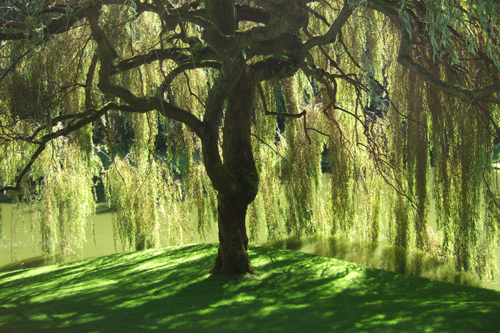
They Hung-Up Their Harps
| “By the rivers of Babylon we sat and wept when we remembered Zion. There on the poplars we hung our harps.” |
| —Psalm 137:1-2 |
We don’t know who from the Babylonian captivity of Jerusalem wrote the words in the Scripture passage above. The Bible tells us that the walls of Jerusalem had been torn down, the Temple burned, and all the articles of worship used there were carried away to Babylon. We also know that this enemy abducted the chief priest and others who worked in the Temple.
All of the people mourned at the loss of their homeland and the loss of their beloved Temple. But, no one mourned as much as those who had regularly prepared for the rituals of worship in the Temple and who had daily served and led in the worship of Jehovah, the One True God.
In the passage of Scripture above, we can clearly hear the heartbreak that they felt. From their land of captivity in Bablylon, they had lost all they had known and loved, including their music that led them in worship. Their hearts simply could no longer sing the songs they once knew, so in great sadness, they hung up their harps.
What did the Babylonians require of these Jewish exiles, who probably served as slaves in whatever capacity the enemy could conjure up? And, how could the Jewish exiles possibly respond to the taunts of their captives, while they labored under these wicked taskmasters? It was a simple fact that the exiles could no longer worship freely, nor could they experience the joy in worship that they had once known so well in Jerusalem.
Tell me, dear ones, at least for a season has the Lord asked you to “hang up your harp”? Has a twist of fate taken your familiar and gifted service to God from you? Have the people you once joyfully served moved on without you? Has your family forced you out of the nest? Have they given your beloved job to someone younger? Have you had to trade your familiar home with its cozy kitchen for retirement living?
Has God asked you, by this unwanted development in your life, to serve Him in another role—one for which you feel totally unprepared or ill-equipped? It is an all-too-common fact that sometimes God takes us away from the familiar so that we might learn a hard, but necessary, lesson from Him.
Consider Moses, who grew up in the palace in Egypt, but later was forced to flee at the age of forty into the desert to tend sheep for yet another forty years. We know that eventually God called Moses out of the desert and back to Egypt to negotiate with the king for the release of the entire nation of God’s chosen people. Looking back from a new perspective, we can clearly see that God had a reason for taking Moses’ “harp” from him.
We learn in Psalm 126 that the Jewish people taken captive into Babylon did indeed return to Jerusalem after seventy years. Once back in their homeland, God again filled their mouths with songs of worship. Psalm 126:1-2 tells us:
“When the Lord brought back the captives to Zion, we were like men who dreamed. Our mouths were filled with laughter, our tongues with songs of joy.”
Once again, God made use of the harps that for seventy years had hung on those poplars. As we consider this incident recorded in Scripture, we can come to realize that God also may allow us to once again take up our own “harps.” Or, He may teach us how to play and sing using a different “instrument.”
Whatever He chooses to do, we know that God does all things well. Though we may not sing the same songs of joy we once did, God will surely give us the grace to once again make music through our lives. We simply need to allow Him to make the choice!
—Posted: Monday, September 2, 2024
_______________
![[Photo of the moon rising over a lake]](https://www.rpcerie.org/images/moon_over_a_lake.jpg)
Reflection
| When Jesus spoke again to the people, he said, “I am the light of the world. Whoever follows me will never walk in darkness, but will have the light of life.” |
| —John 8:12 |
| “You are the light of the world. A city set on a hill cannot be hidden. Nor do people light a lamp and put it under a basket, but on a stand, and it gives light to all in the house. In the same way, let your light shine before others, so that they may see your good works and give glory to your Father who is in heaven.” |
| —Matthew 5:14-16 |
Have you ever considered how differently the brightness of the moon affects what we can see at night? Driving seems so much easier. And, the distance we can see is so much farther. Nights with a full moon allow us to see so much more than we can see when the moonlight is absent or diminished.
Scientists tell us that the phases of the moon, and the amount of light we observe from the moon, results from how much of the moon’s surface faces the sun and reflects the sun’s radiance. The moon produces no light of its own. It serves only to reflect the glory of the sun.
When we meditate on Jesus’ words in the first Scripture passage at the beginning of this blog post, where He told us that He is the Light of the World, we must realize that Jesus has given us the same designation that Creator God gave to the moon. As His devoted followers, Jesus expects us to understand that we give divine light to those around us only to the extent that we reflect Him. The more “face time” we have with Him, the more fully we will reflect His powerful light.
In the second Scripture passage at the beginning of this blog post, where Jesus said that we are lights of the world, He used the illustration of a lamp. Even if we shine as lamps in this dark world, we must have oil, or power, from some source other than ourselves. The image of oil in the Bible often refers to the power of the Holy Spirit.
We cannot expect to give off the Light of Christ in this world unless we reflect Him, just as the moon reflects the sun, nor can we shine as lamps without the oil of the Holy Spirit. The divine light must come from outside our own selves.
This question, then, is worth asking ourselves:
“Is the ‘light’ I give off coming from the dimly lit bulb of my own selfish glory, or do I truly reflect the glory of my blessed Savior, the Lord Jesus Christ, and the glory of God, my Father in Heaven?”
How we answer that important question makes a difference. And, that difference is like night and day!
—Posted: Monday, August 26, 2024
_______________

Dead Branch or
Budding Endorsement?
| “He is like a tree planted by streams of water, which yields its fruit in season and whose leaf does not wither.” |
| —Psalm 1:3 |
In this season of political endorsements, I enjoyed reading the way in which God, in front of the Israelite nation, set up Aaron as His endorsed leader from the tribe of Levi. The story, recorded in Numbers 17, occurs just after the nation complained against Aaron and Moses as their leaders. A group of men had become insolent and had risen up to take the leadership and the priesthood away from these two whom God had chosen.
You may remember the story in which God allowed the ground to swallow these imposters, as a testimony to His anger against their sinful rebellion. However, this didn’t end the rebellion, and God sent a plague that killed 14,700 to show His power. And, even though Aaron stood between God and the rest of the Israelites and stopped the plague, interceding for them, they continued to grumble about his leadership.
At this time, God told Moses to have the leaders of the twelve tribes come to the entrance of the Tent of Meeting and bring with them their staves or rods, the symbol of the authority of their governmental leadership. We read in Numbers 17:5 that God said:
“The staff belonging to the man I choose will sprout and I will rid myself of this constant grumbling.”
The next day, when Moses entered the Tent, he found Aaron’s staff not only sprouted, but budded and blossomed, producing almonds! From that day on, God asked Moses to keep that rod before the Testimony as a remembrance of God’s decree and endorsement of Aaron as leader!
Isaiah predicts another time, yet to come, when God will endorse His people before the world. Here’s what He promises in Isaiah 60:21:
“Then will all your people be righteous and they will possess the land forever. They are the shoot I have planted, the work of my hands, for the display of my splendor.”
I like that! Not for the aggrandizement of these chosen ones, but for the display of God’s splendor.
And, in our world today, how does God endorse us? We know that, by ourselves, we display nothing but the image of a dry stick. However, with the life Jesus gives us through His atonement, we can bud with His “sap” running through our veins. I compare this to the sermon Jesus gave in John 15 about the Vine and the Branches. The only way the branches can provide fruit, is when they continue to exist, attached to the Living Vine.
We are nothing but dry branches without Him. John 15:5 makes it clear with these words of Jesus:
“I am the vine; you are the branches. If a man remains in me and I in him, he will bear much fruit; apart from me you can do nothing.”
God wants to endorse us by displaying His splendor through us, by living His life through us, and by making our lives spiritual food for others. May we know that kind of usefulness to bring Him glory!
—Posted: Monday, August 19, 2024
_______________

Going Overboard
| “Now when Simon Peter heard that it was the Lord, he put on his outer garment (for he had removed it), and plunged into the sea.” |
| —John 21:7b |
I love impetuous Peter. He couldn’t hold back his enthusiasm or his love for the Lord Jesus. Familiar around boats all his life, twice we read in the Gospels that he jumped overboard into the water.
The most familiar story we remember comes from Matthew 14:22-32. This passage tells the story of the storm on the Sea of Galilee, or Lake of Gennesaret, in which the disciples feared for their lives. Jesus came to them on the water, and Peter jumped out of the boat and walked on top of the water to meet Him. Here Peter exhibited enough faith to take a few steps toward Jesus before he had to call out for rescue.
A lot of time and experience had passed between that event and the one in which Peter again jumped out of the fishing boat to greet his Lord. Jesus had gone through the torturous death on the cross and come out of the grave alive. The disciples had seen Him a few times before He came to them on this morning after they had fished all night. Yet, Peter had haunting memories of his three denials of his Lord (recorded in John 18) and couldn’t let this moment pass to show his love and even shame over what he had done.
I like Peter. He always seemed to show his love to Jesus in obnoxious ways. He would say things and do things that appeared unorthodox and perhaps silly. No one could keep him and his wild passions for Christ from going overboard. In more ways than two!
Peter had zeal. We don’t often use that word anymore. But, it fits the description of this powerful disciple. God likes zealous people. In Numbers 25:10-13, God rewarded Phinehas for his courage in defending the honor of his God and his zeal. In John 2:17, the disciples watched Jesus overthrow the tables of the wicked in the temple and commented on His zeal for God.
In Romans 12:11, we read instructions to those who know Christ:
Never be lacking in zeal, but keep your spiritual fervor, serving the Lord.
We should ask ourselves:
- Can people see in us a definition of zeal for God, for Christ’s name, for His church?
- Do we dare go overboard for Him, even though others might scoff at us?
- Do we love God with an eagerness that glorifies His greatness and causes those who don’t know Him to take notice?
- Does our fervor encourage others to display the same fervency?
- Does it keep us going even when all seems bleak?
Let us pray with the hymn writer who asks God for “one holy passion filling all my frame.” 1 His love for us went overboard when God sent His only Son to us, and then allowed His death on the cross to pay for our guilt. He deserves nothing less than our passion for Him!
______________________
| 1 Croly, George. “Spirit of God, Descend Upon My Heart.” Public Domain. |
—Posted: Monday, August 12, 2024
_______________

Moreover
| So God said to him [Solomon], “Since you have asked for this and not for long life or wealth for yourself, nor have asked for the death of your enemies but for discernment in administering justice, I will do what you have asked. I will give you a wise and discerning heart, so that there will never have been anyone like you, nor will there ever be. Moreover, I will give you what you have not asked for—both riches and honor— so that in your lifetime you will have no equal among kings.” |
| —1 Kings 3:11-13 |
Solomon began his reign as king with a humble heart. He was seemingly aware of his own frailty and the enormity of the position which his father, David, had left him.
The Lord had appeared to Solomon in a dream and told him to ask for whatever he wanted from God. This sounds so much like the “genie in the bottle” theme of three wishes. But, it’s not. God seriously wanted Solomon to take on this new task of king with all the resources that he needed. And, in order to rule well, Solomon asked for a discerning and wise heart. The Scripture says that this pleased God. So, God fulfilled His promise and gave Solomon the discernment and wisdom for which he had asked.
Then, right in the middle of God’s response to Solomon’s request, we see the word, Moreover. Far beyond what Solomon had asked, God added riches and honor to the gifts He gave Solomon that day. Now Solomon would be able to showcase the glory and splendor of his God to the whole world.
You see, God gives abundance to His children, to those He knows have the right heart attitude and will use the gifts He gives them for His glory. So, it is no surprise that when Solomon chose to ask for qualities that would help him rule justly, God gave Him those qualities and also showered Solomon with even more.
But, what about us? Should we expect the same abundant gifts that God gave Solomon? Not necessarily, but we can expect Him to give us an abundance of His grace, which comes in a multitude of ways to His dearly loved children. In Jesus’ teaching about Himself as the Good Shepherd, He states in John 10:10:
I have come that they may have life, and have it to the full [abundantly].
Much like the plain and simple water that Jesus turned into a splendid and special wine during the wedding at Cana, God intends to turn the ordinary things for which we ask Him into blessings we can give back to Him and manifest His glory. He will always be known as the God of Moreover—the God of abundance and lavish blessing.
Let’s look at our lives and our prayers through the eyes of Solomon and through the eyes of those people attending the wedding at Cana. What “above and beyond” blessings has God given to us on top of those things for which we have asked? Then, let’s praise Him and glorify Him through all He has given to us!
—Posted: Monday, August 5, 2024
_______________

Not My Boss!
| “Be self-controlled and alert. Your enemy the devil prowls around like a roaring lion looking for someone to devour. Resist him, standing firm in the faith.” |
| —1 Peter 5:8 |
I heard them arguing. This five-year-old and his three-year-old sister had a dust up about something. Giving it all she had, she stretched her little chest out and faced him with the words: “You’re not the boss of me!”
Sometimes we grown-up Christians forget the authority with which God has equipped us in this world—where Satan roams about seeking to devour us. God, by His Holy Spirit, has given us His power through which we can resist evil and stand against the foe.
William Gurnall, the 17th Century theologian, wrote an entire book about the verses in Ephesians 6, which goes into great detail how we should prepare to engage our enemy. Of the phrase in Ephesians 6:10—“in his mighty power”—Gurnall writes:
The apostle’s drift is so to encourage the Christian to make use of God’s almighty power, as freely as if it were his own, whenever assaulted by Satan in any kind. 1
1 John 4:4 reminds us of this power to which we have free access:
Greater is he that is in you, than he that is in the world.
We have no power in ourselves to withstand the awful violence and deceit of the Enemy. So, God gives us the Holy Spirit, and all the mighty power that belongs to Him. Thus we, through faith, have the power of almighty God on our side. When we step out in faith, accept the pieces of armor God provides us, and pray for His power to fill us, we have an authority few of us may realize.
The next time we engage in a battle over temptation, or experience the subtle attempts of the evil one to take us down emotionally, physically, or spiritually, we must puff our chests out and say with the authority we have been given in Christ: “Satan, you’re not the boss of me!”
______________________
| 1 Gurnall, William, The Christian in Complete Armour. Carlisle, Pennsylvania: The Banner of Truth Trust, 1979 (reprinted). p. 25. |
—Posted: Monday, July 29, 2024
_______________

Adding Alleluias
| “Glorify the Lord with me; let us exalt his name together.” |
| —Psalm 34:3 |
If I asked you what contribution Charles Wesley made to Christian history, most of you would know he wrote hundreds of our beloved hymns. If I asked you the same question about Martin Madan, you probably would have no idea. But, if I asked you to sing the words to Christ the Lord is Risen Today, written by Charles Wesley, you would add the words he didn’t put in himself. The “Alleluias” were added later by Martin Madan.
Martin Madan added “Alleluias” to other hymns of Charles Wesley’s, through whom he came to the saving knowledge of Christ. Yet, virtually unknown today, Madan influenced others for Christ, and even became a preacher of the Gospel. Still, his most remembered legacy comes in this simple addition to Wesley’s hymns. 1
This made me wonder. Do we add “Alleluias” to other people’s praises? Do we enhance the praise and testimony of others? Do we, together with them, exalt God’s name, as the Scripture verse at the beginning of this blog post suggests?
Surely, when God’s people meet and exalt Him, He sends His Holy Spirit to enliven, empower, and encourage them. We read in Acts 2:1 that:
When the day of Pentecost came, they were all together in one place. Suddenly a sound like the blowing of a violent wind came from heaven and filled the whole house where they were sitting.
Three times in the first two chapters of this Book of Acts, in giving the story of the first Church, the author uses the word “together”:
- At first, they met together for prayer. (Acts 1:14).
- In Acts 2:1, the Holy Spirit came to them when they met together.
- In Acts 2:44 and 46, we read how they met together, as God formed through them His early Church.
It’s apparent that God brings His power to bear on believers when together they meet and praise Him. We may not all have a gift for writing hymns, or preaching, or praying aloud. But, we can all add “Alleluias.” The power of the combination of our praise exalts our God and brings others to the wonder of His presence with us. Alleluia to His name!
______________________
| 1 Information for the opening of this blog post was gleaned from the following book: Brown, Robert K. and Mark R. Norton. The One Year Book of Hymns. Wheaton, IL: Tyndale House Publishers, 1995. pp. May 25, May 27, August 8. |
—Posted: July 22, 2024
_______________

Move Ahead
| The Lord said to us at Horeb, “You have stayed long enough at this mountain. Break camp and advance.” |
| —Deuteronomy 1:6 |
I am “risk averse”:
- As a pianist and organist, I always look at printed music, even though I have a particular piece completely memorized.
- I try to stay out of crowds, afraid of the danger that may lurk there.
- I avoid certain sections of highway during snowstorms, lest I become involved in an accident.
- I like to plan ahead. And many times, I have opted to stay put rather than move ahead.
The Israelites showed this same kind of aversion to risk. Or, let’s be honest, they displayed a decided lack of faith during the time they wandered in the wilderness. They had certainly seen God perform amazing miracles for them in their escape from Egypt. God had certainly supplied their needs and protected them. Still, they persisted, with heavy cement-laden feet, to resist forward movement in their lives, individually and as a nation.
When God calls us to take a risk, our arguments usually begin with a long list of “what ifs”:
- What if we come up against things we’ve never seen before—men that look like giants, violent land owners, walled cities we may have to conquer?
- What if we die of plague, starvation, wild beasts, or warring enemies?
- What if we run out of food or water?
- What if we take a wrong turn and lose our way?
- What if …
In the first two chapters of the Book of Deuteronomy, God reminded the Israelites of His faithfulness. And, He also reminded them of their lack of faith. He had prepared really big things for them in the days ahead and He needed them to get moving.
Twice we read that God said: “You have stayed here long enough.” He reminded them that He had watched over them and provided for them for forty years. Later, He egged them on to move and take possession of the land He had promised to them since the days of Abraham.
I like the second verse of the hymn, “God Moves in a Mysterious Way.” 1
Ye fearful saints, fresh courage take;
The clouds ye so much dread
are big with mercy, and shall break
with blessing on your head.
When God prompts us to move on—to venture out and trust Him—we must move forward in faith, fully relying on His provision and protection. If we turn a deaf ear to God’s call to move onward and insist on standing still, mired in the fast-drying cement of our current situation, we stand the greater risk of getting stuck where nothing will move us.
______________________
| 1 Cowper, William. God Moves in a Mysterious Way. Verse Two. Public Domain. |
—Posted: Monday, July 15, 2024
_______________

Fervor
| “Don’t burn out; keep yourselves fueled and aflame. Be alert servants of the Master, cheerfully expectant.” |
| —Romans 12:11 MSG |
I can’t even imagine what it would have been like to iron clothes before the availability of electricity. Not only were there no “easy-care” fabrics, there wasn’t even a way to maintain a constantly heated iron to use for the entire task. Most women used a series of irons, heated one at a time on the wood stove nearby. They had tricks to use for doing the job with a super-heated iron and other tricks to use as the temperature of the iron cooled.
This reminds me of something that the Apostle Paul said in his letter to the Roman Christians in the early church. Romans 12:11 from the New International Version states it this way:
Never be lacking in zeal, but keep your spiritual fervor, serving the Lord.
According to Webster’s New Collegiate Dictionary, “fervor” amounts to “warm, steady intensity of feeling or expression.”
I think the key word here is “steady.” Certainly the invention of electricity makes the steady heat of a clothes iron possible. Although we sometimes have an awareness of when the electric current reheats our iron, we do not have to do anything to make it happen.
Where does the “fervor” come from for a “steady warmth” of service to God? Like the old-fashioned iron, we must go to the source of the “spiritual heat” and spend sufficient quality time with our Lord, whose Holy Spirit burns within us. To maintain that steady warmth of fervent passion throughout the day, we must stay “plugged into” Him and draw on His power, moment by moment.
It may seem corny to state it, but it’s true: “Seven days without prayer make one weak.” Even one day without an infusing of God’s miraculous power, puts us in jeopardy of making crucial mistakes, of sinning against our Lord, or of losing our focus and our fervor in living for Him and for serving Him.
Remember the symbolism of the Day of Pentecost, as recorded in Acts 2? Tongues of fire landed on the heads of each of Jesus’ disciples. This symbol of the Holy Spirit’s power reminds us of the “holy fire” that God wants to ignite within each of us: for power, for light, and for a passion to do His work in this world. Let us pray daily for that “fire” to fervently burn within us, so that we might become a steady usefulness for our Savior.
—Posted: Monday, July 8, 2024
_______________

Used Tea Bags and Used Pencil Stubs
| “Do not sacrifice to the Lord your God an ox or a sheep that has any defect or flaw in it, for that would be detestable to him.” |
| —Deuteronomy 17:1 |
When I was a child, I remember a missionary speaker at my church who told of receiving “care packages” from the States. Inside one box he discovered that the people had sent boxes of used tea bags and used pencil stubs. Imagine receiving that kind of gift sent to you in Jesus’ name to help the people to whom you were trying to minister to and expose to the Gospel! Why, it’s “sloppy mediocrity” at best.
The prophet Malachi was burdened for God’s people about just this kind of “sloppy mediocrity,” selfishness, and heartless worship. Apparently God’s people were giving sacrifices to Him consisting of spoiled food and diseased animals. God rebuked them in Malachi 1:14:
“Cursed is the cheat who has an acceptable male in his flock and vows to give it, but then sacrifices a blemished animal to the Lord. For I am a great king,” says the Lord Almighty, “and my name is to be feared among the nations.”
In our day, we may not present defiled animals or spoiled food to God. But, many of us are quite content to give Him that which has cost us little or nothing. In speaking to a mom of a chorister in my former church children’s choir about her child’s erratic attendance, she responded to me with: “It’s only church, for heaven’s sake!”
Make no mistake about it, God wants our very best when we give Him our worship. He wants our sincere excellence. This doesn’t always necessarily mean “perfection.” But, it does mean a heartfelt giving of the very best that we have to give in every situation in which we strive to please God.
Surely when we give offerings to those less fortunate, we can give gifts our own children would enjoy. When we bring food for the pantry ministry to the poor, we can buy the same brands we would buy for ourselves. Whenever we give, let us strive to please God. We should do our very best to follow the admonition of the Apostle Paul, writing in 2 Corinthians 9:6-7, when Paul reminds us of what God desires from His people:
Remember this: Whoever sows sparingly will also reap sparingly, and whoever sows generously will also reap generously. Each man should give what he has decided in his heart to give, not reluctantly or under compulsion, for God loves a cheerful giver.
—Posted: Monday, July 1, 2024
_______________
![[Photo of a child refusing medicine]](https://www.rpcerie.org/images/child_refusing_medicine.jpg)
Accept the Remedy
| “These are the scriptures that testify about me, yet you refuse to come to me to have life.” |
| —John 5:39-40 |
Neither a child spitting out his or her medicine, nor an old man refusing “any more pills,” do themselves any favors when it comes to their healing. When a remedy exists, it is wise to take advantage of it.
Even in Jesus’ time, He met people who didn’t appear to really want a remedy for their woes. In John 5:1-15, we read the story of Jesus meeting a man at the Pool of Bethesda who had been unable to walk for 38 years. The man was full of excuses why he had not been healed in all that time, even when a common remedy was available. Jesus asked him, “Do you want to get well?” To prove the man’s faith, Jesus told him to stand and walk. At once, through God’s power, the man stood and walked.
Many people, in the death grip of sin, have heard the “cure” for their lost condition. But, they have refused the remedy that Jesus offers to them. The remedy comes through the simple, yet difficult, submission to the truth of the Gospel: confession of sin, repentance (turning from sin), and acknowledging that God has graciously given them the free gift, through Christ’s death for them on the cross, as the payment they could never make for themselves to a righteous God.
If your conscience has burdened you because of your refusal of the “cure” for your condition, recognize this voice as Jesus stepping up to you, as He did to this man at Bethesda and saying: “Do you want to get well?” Then, when He says to you: “Get up, walk with me, and accept my healing!” you will experience your cleansing from sin and peace with God—in effect, a new life. Then, you too will have learned that when a remedy exists, it is wise to take advantage of it.
—Posted: Monday, June 24, 2024
_______________

Squeezing Out the Sweet Juice
| “But his [the blessed man’s] delight is in the law of the Lord, and on his law he meditates day and night.” |
| —Psalm 1:2 |
Experts say that squeezing two to four oranges yields about eight ounces of juice. Nothing can beat genuine freshly-squeezed orange juice for flavor and sweetness. Yet, most of us would rather buy the “made from concentrate” brands in the supermarket. Why is that? Well, I suppose because of the time and mess involved. At least that’s my excuse.
And, why don’t Christians enjoy the sweet fellowship with God in Jesus Christ more? Probably for a similar reason. It takes time to squeeze out the best flavors from His written Word. Nothing substitutes for meditation on the written Word of God and the truly “sweet truths” we learn through it.
In Scripture, we read that David—named the “man after God’s own heart”—loved meditation. Vividly we see, in Psalm 19, that David meditated on the wonders of the sky, and the wonders of the laws of God. After considering, He prayed, as recorded in verse 14:
“May the words of my mouth and the meditation of my heart be pleasing in your sight, O Lord, my Rock and my Redeemer.”
The 17th century Puritan minister, David Clarkson, wrote about the advancement of faith through meditation. He stated that God develops faith in us when we focus our thoughts on His express promises, on Scriptural assertions, on God’s acts through and on behalf of His people, on God’s work through the prayers of His people, and on God’s commandments. Clarkson writes:1
Gather the promises and meditate on them. They are meat in this wilderness. Often be mining their treasures. Do not allow these pearls to lie neglected in the field. Treasure them up. Fill your memories with them. A promise treasured will afford comfort in our callings, dungeons, and banishments. Meditate frequently and seriously on them.
Occasionally, we should try paring down our Scripture reading to just a few verses and spend time meditating word by word. Specifically:
- Pen in hand, expand our thoughts about God and record our thoughts on paper.
- Write a prayer using the words of the verses we have just read.
- Remember a hymn that connects to the concepts on which we have just meditated.
- Consider other Scripture passages that bring out the same truths about God, and compare and contrast them.
In other words, squeeze out those “sweet juices.” If we do this, we will develop a connoisseur’s taste and build our faith in the process!
______________________
| 1 Clarkson, David, quoted in Voices. Richard Rushing, editor. Carlisle, PA: The Banner of Truth Trust, 2009. p. 174. |
—Posted: Monday, June 17, 2024
_______________

Stepford Christians
| For such men are false apostles, deceitful workmen, masquerading as apostles of Christ. And no wonder, for Satan himself masquerades as an angel of light. It is not surprising, then, if his servants masquerade as servants of righteousness. Their end will be what their actions deserve. |
| —2 Corinthians 11:13-15 |
The 1975 movie, The Stepford Wives, has remained in my memory: not only as a very bizarre story, but as an example of how very like the “Men’s Association” our enemy—the prince of this world, Satan—operates.
The story takes place in the affluent, idyllic town of Stepford, Connecticut. A new resident, Joanna, notices how strange all the women seem to appear. They are fawning wives, mindless, and perfect in every way. What she doesn’t realize is that one-by-one, the husbands of the “Men’s Association,” who make it their mission to completely control their wives, have actually murdered their wives and replaced them with perfectly engineered robots. These robots look identical to the wives. And, the robot wifes have absolutely no flaws whatsoever.
These formerly very successful, caring, and professional women, now transformed into robots, think only of pleasing their husbands in every way. Since they are not real, they have given up any resemblance to the actual personhood of each wife they have replaced.
Joanna watched as one of her more “normal” neighbors seemed to go through this metamorphosis. For one thing, her tennis court in the back yard was dug up and replaced with a putting green for her husband. Only when Joanna’s own family becomes victims of the “Men’s Association” does she try to escape in order to protect her own life.
We would all love to be the perfect model of a Christian, not only pleasing to God, but especially pleasing to each other. We study the right “moves” of those Christians that we admire and try very hard to imitate them. We learn to play the game of “church” and strive to never allow our own sinful natures to become too visible. Over time, we come to realize that to openly acknowledge sin, to repent, to ask for genuine forgiveness just takes too much humility. To do that, we would have to admit that we cannot live the Christian life in our own strength.
While it may seem somewhat honorable to overlook the faults in others, to look for the best in each other, and to see our churches as perfect examples of lived-out Christianity, we should never tolerate covering up sin and hiding horrific wrong-doing. Christ did not die for people who pretend to be without fault. He died for sinners and welcomes anyone who truly comes to Him in honest confession.
Like Joanna, the world watches us. Anything in us or in our churches that smacks of being phony is clearly evident to them. Why would they want to join a group of seemingly “perfect” people anyway, especially when they know the sinfulness of their own hearts?
We glorify God the most when we rely on Him for His grace to live our lives according to His desires and when we willingly acknowledge and repent of our sins. We need to embrace the intention to do away with the plastic complexion, the nylon hair, and the mindless play-act!
—Posted: Monday, June 10, 2024
_______________
![[Photo of a sailboat in full sail]](https://www.rpcerie.org/images/sailboat_in_full_sail.jpg)
Servant Winds
| “He makes the winds his messengers.” |
| —Psalm 104:4 |
The Bible’s use of the image of “wind” fascinates me. Some passages speak of stormy winds, such as those sent to the ship in which Jonah tried escaping God’s call, as recorded in Jonah 1:4. Or, the stormy winds sent while the disciples maneuvered to cross the Sea of Galilee, as recorded in Matthew 14:22-36. Or, the stormy winds sent to Paul and the other prisoners traveling to Rome, as recorded in Acts 27:1-44. In each case, God had specific purposes for such storms.
In some cases throughout the New Testament, the word “wind” refers to the Holy Spirit. In Acts 2:1-13, we read the story of the first Pentecost during which “a violent wind came from heaven and filled the whole house where they were sitting.” That powerful “storm” filled everyone there with the Holy Spirit.
In Jesus’ conversation with Nicodemus, recorded in John 3:1-21, He said:
“…the wind blows wherever it pleases. You hear its sound, but you cannot tell where it comes from or where it is going. So is everyone born of the Spirit.”
God’s people and His Church both need the “wind” of the Holy Spirit to blow within us, to remove the dust that has fallen upon us during the years we sat idle. We need to pray again that the Living Lord Jesus Christ would breathe His wind through us, sending us in new directions, bringing new birth by the Holy Spirit, and making the “wind” His servant to fulfill His purposes in us, through us, and for us.
Like seasoned sailors, we need to watch for the direction of the God-given spiritual winds and set our sails appropriately. We need to meet together and wait in prayer, just as the believers did after Jesus’ ascension, watching for Him and for His promised Holy Spirit.
This well-known hymn expresses the kind of prayer God wants us to pray:1
O Breath of Life, come sweeping through us,
Revive Your church with life and pow’r,
O Breath of Life, come, cleanse, renew us,
And fit Your church to meet this hour.
O Wind of God, come bend us, break us,
Till humbly we confess our need;
Then in Your tenderness remake us,
Revive, restore, for this we plead.
______________________
| 1 Head, Bessie P. O Breath of Life. Public Domain. |
—Posted: Monday, June 3, 2024
_______________ The Art of the Blend When we think of the work of an artist who works with oil paint, we often neglect to consider the artistic competence and sensitivity needed to prepare the paint used for the project. A good artist considers the pigments of color and the medium through which to use those colors. He or she also chooses between solvents for the viscosity (thickness) of the paint and for the varnish that will give the appropriate glossiness to the finished work. Perfumers also study their art by learning about the distinguishing characteristics of fragrances. Because of the keen sense of smell they must possess, the most skilled ones of these people get dubbed “The Noses” by those in that field. Such perfumers know the strengths and power of each fragrance, and they carefully blend only those elements which augment the others. Similarly, organists exhibit concern about what choices they make in registering the sounds for each piece of music they play. As I listened carefully with my eyes closed, my first organ teacher quizzed me to give the names of each pipe. Is the sound a reed, a flute, a diapason, or a string? Does it match the intended mood the composer of the music requires for this particular piece? Is one stop too sharp to play alongside another because it will cover the sound or blend poorly? God, the most creative of all artists, looks at His church in much the same way as these other professionals look at the works they produce. He desires to create something beautiful for His world out of the flesh and blood of His people in specific locations. Look around at those in your local church. God has placed, in your church, people of various ages, various races, various abilities, and various limitations. He has carefully gifted His people with talents, abilities, and with a wide range of life experiences. Children love to gather around old Uncle Pete because of his kind and loving ways. Grandma Pearl gets everyone laughing each time they talk with her. Roy has such knowledge of Scripture that people flock to his class. And, Ruby sings like an angel and brings the Holy Spirit near whenever the congregation hears her voice. Carrie and Fred have owned a successful business for many years and they freely give of the wealth God has provided them. They love to see God’s church blessed through their giving. Beverly doesn’t have money or abilities to teach, but when she gets in the kitchen, she blesses the entire congregation through the foods that she so lovingly prepares. God also places His people in churches where they need growth and maturity—perhaps even through learning to get along with others who see things in opposite ways from them. He is creating a beautiful body of work for His glory. We should stand in awe of His workmanship. Look at those in your church as instruments in God’s hands, as gifts to you and others, and see yourself in a way that makes you happy to share with others the qualities that God has given you. Stand back and look at the picture God is painting in your congregation. Take time to smell the aroma of His blessing. Pause, in a quiet moment, to hear the music of His joy in your midst. Praise the Artist of Heaven today for the magnificently creative way He has blended the people in your church into a powerful force for His Kingdom! —Posted: May 27, 2024 _______________ Handiwork I so much appreciate “handiwork.” From her youth onward, my grandmother had the reputation as a particularly fine seamstress. I own a dress she made for a toddler with the tiniest handmade button holes. Today, I admire her talent more than a hundred years after she first produced this amazing dress. My nephew has a business carving and painting all kinds of colorful wooden lures for salt water anglers. No one would doubt his talented handiwork. He has become someone who now has a national reputation as a fine craftsman. My late sister painted large murals, crafted thousands of words of pen and ink calligraphy, and, with a dainty hand in the tradition of our grandmother, sewed many pillows and articles of clothing decorated with buttons and ribbons. Considering those individuals to whom God has given uniue talent, in the Early Church a disciple of Jesus, a woman named Dorcas, became sick and died. Acts 9:39 records this sentence: This passage of Scripture demonstrates to me that, just as everywhere and at all times God reveals His handiwork through the marvelous creation of our universe, He has also created humankind in His image with the same abilities to create amazing items for themselves. Creation, and all kinds of art, did not just happen for the utilitarian needs of humans. God gave humans this ability, so that they could create beauty. Just as God looked at His creation and exclaimed that what He had made was good (Genesis 1), He has allowed us the joy of creating, too. Besides that, He enables us to feel enjoyment in the handiwork of others. In so doing, we derive pleasure and can offer praise in the revelation of Himself that we see in human creativity. Psalm 8 tells us that God has set His glory above the heavens. God reveals His inherent glory. A few verses later, the Psalmist writes that God has crowned man with glory. Our glory derives from His glory. Every creature shows the glory of the Creator in some way. The more we know this great Creator-God, the more beautiful and glorious we become, as His image bearers. Let us thank God today for the ways in which His glory, His creative beauty, and His magnificent design, shows forth in our lives and in the lives of those we know. All of this handiwork should prompt us to offer our praise and worship to such a breathtakingly glorious God. —Posted: Monday, May 20, 2024 _______________ Perspective You may remember the 1989 movie, “Honey, I Shrunk the Kids,” in which a scientist father accidently shrinks his two teen-age children and two of their friends. This poses all kinds of dangerous threats to these teens, as they battle to stay away from danger while their father searches for them. Sometimes our perspective gets out of whack, just as things did in this movie. We see problems that loom nearby in such a way that we dwarf God by allowing Him to fall away into the background. In such a case, we need an adjustment to our perspective. Many of the Psalms reveal the way in which saints of the past had to deal with their perspective. Some Psalms begin with tales of woes too large with which the Psalmists can cope. However, once they get a different view of God, the enormity of their problems contract to a much more manageable size. In Psalm 73, Asaph, the musician, begins his Psalm remembering how he had nearly slipped away because he was looking at the prosperity and the seeming good luck of the wicked. He says he felt oppressed until he entered God’s sanctuary and got a different perspective. He ends this Psalm praising God’s goodness and sharing his gratitude for the riches of God’s grace. Psalm 73:25-26 give us a glimpse of Asaph’s change in perspective: Many times the Psalmists have to remind themselves of the greatness of God. They do this by talking directly to themselves through the words they write in their Psalms. This same kind of reminder can stir us, as well. We can see God’s proper perspective: in our church services, or after a prolonged period of time spent in reading His written Word. When this happens, we will be able to see the extent of our woes in a much clearer way. We can shrink them down to size and allow God to show us His power and wisdom that rule over us. I like the way that Paul explains the process of moving from despair to faith by means of gaining a whole new perspective, as recorded in 2 Corinthians 4:16-18: It’s important for us to remember that a proper perspective can change everything! —Posted: Monday, May 13, 2024 _______________ The Devil and Cinderella Cinderella, the beauty of her family, lived her life by the stories her stepsisters told her and in the mockery and servitude in which they made her live. She willingly allowed them to pile the dirty jobs on her and to intimidate her into believing she wasn’t fit to attend the ball she prepared them to attend. In their book, The Sacred Romance, Brent Curtis and John Eldredge liken many of us to this poor housemaid. The authors suggest that we believe the lies that we may have heard all our lives, instigated by our real enemy, Satan himself.
This very trickery worked on Eve in the Garden of Eden when Satan questioned her—as recorded in Genesis 3—and asked “Did God really say?” Unsuccessfully, Satan tried these same tactics on our Savior when He went into the wilderness of temptation before He began His public ministry. Satan tried to put doubts into Jesus’ mind over God’s plan, as well as doubts about His place in it, using such statements as “If you are the Son of God …” found in Luke 4:3, 9. Satan likes to tell false stories to us, as well. Sometimes he uses the voices of family members or classmates, causing us to believe the lies he tells us. If we allow him to convince us, our whole lives can feel useless and pointless, unaware of the Prince of Peace who has a new name, a new nature, and a new ever-after for us. Here’s how the authors of The Sacred Romance put it: 1 Have you been listening to the wrong voices? Let God’s written Word, His great Love Letter to us, fill your mind and heart. And, accept from Him the invitation to see yourself as a Child of the King with a royal purpose. Allow Him to invite you to the singing and praising of God’s people, where you will find a sense of belonging and true rejoicing. ______________________![[Photo of blended colors]](https://www.rpcerie.org/images/blended_colors.jpg)
“God has arranged the parts in the body, every
one of them, just as he wanted them to be.”—1 Corinthians 12:18 
“The heavens declare the glory of God; and
the firmament sheweth his handywork.”—Psalm 19:1 KJV All the widows stood around him [Peter], crying and showing him the robes and other clothing that Dorcas had made while she was still with them.

“He sits enthroned above the circle of the
earth, and its people are like grasshoppers.”—Isaiah 40:22 Whom have I in heaven but you? And earth has nothing I desire besides you. My flesh and my heart may fail, but God is the strength of my heart and my portion forever.
Therefore we do not lose heart. Though outwardly we are wasting away, yet inwardly we are being renewed day by day. For our light and momentary troubles are achieving for us an eternal glory that far outweighs them all. So we fix our eyes not on what is seen, but on what is unseen. For what is seen is temporary, but what is unseen is eternal.

“Your enemy the devil prowls around like a
roaring lion looking for someone to devour.”—1 Peter 5:8 Fortunately for Cinderella, the prince is a romantic who will not give up searching the city until he has found her, and they live happily ever after. And so it will be with us who are the beloved of the great Prince who is Jesus. It is this destiny that so enrages our enemy and makes him determined to destroy the love affair that he can never have a part in.
1 Curtis, Brent, and John Eldredge. The Sacred Romance. Nashville: Thomas Nelson Publishers, 1997, p. 110.
—Posted: Monday, May 6, 2024
_______________

Tell-Tale Marks
| “Live such good lives among the pagans that, though they accuse you of doing wrong, they may see your good deeds and glorify God on the day he visits us.” |
| —1 Peter 2:12 |
One day after teaching all day, I stopped at the local supermarket where I saw a woman in the bread aisle. She seemed smartly dressed, with comfortable shoes, looking intelligent, and collecting her groceries quickly. I wondered if she might be a teacher, too.
Not until I pulled my cart up behind her in the check-out line did I know. There on her back side stretched the all-too-visible line of chalk. I knew it! No one but a teacher would have that tell-tale mark.
Christians should have tell-tale marks, too. Do you have identifying signs—tell-tale marks—that reveal a family likeness to Christ?
Do people recognize the presence of Christ in you by the purity of your speech? By your respectful treatment of others? By your submission to authority? By your refraining from gossip? By your reputation for loving others?
When you sit down to lunch, do you bow and quietly thank God for it? Do you show compassion and caring? Do you live a holy life?
In some settings, governmental law may prohibit us from preaching Christ. But, no law anywhere can prevent us from showing the Fruit of the Spirit: love, joy, peace, patience, kindness, goodness, faithfulness, gentleness and self-control (see Galatians 5:22-23)—even in a public school, or in the public square!
Wherever God has placed us in this world, He expects us to reveal the tell-tale marks He has placed on our life.
—Posted: Monday, April 29, 2024
_______________

Endurance
| “Let us run with perseverance the race marked out for us.” |
| —Hebrews 12:1 |
“Life is not a sprint. It is a marathon.” You’ve no doubt heard that quotation. I would like to think that “Oftentimes, trials are not a sprint, but a marathon.” Some trials God gives us in our lives last a day or two. Others go on far longer than we could ever imagine and demand much more of us than we could have ever thought.
In fact, some troubles take far more strength and endurance than we would naturally have available. Don’t believe the idea that God doesn’t give us more than we can handle—by ourselves, alone. In fact, He often gives us more than we can handle just for the purposes He has of causing us to rely totally on Him to carry us beyond our own strength.
We can find comfort in the Sovereignty of God: His supreme, unlimited, wise authority over everything that happens to us gives us assurance that we are in His hands. Yet, does that mean we have no responsibility at all? Whereas some people think they have to manage everything in their lives, others think that submitting to, and waiting on, God alone, getting out of His way, allows Him to perform His will in us and through us.
I love the way that Carolyn Curtis James writes about this subject: 1
[The writer of the Hebrews] put both ideas side by side without diluting either of them when he charged his readers to “run with perseverance the race marked out for us.” God marks out our race, and we are commanded to run. If we follow logic, sovereignty doesn’t remove human responsibility. It actually increases it. Human responsibility depends on an ordered world in which God is sovereign. You can’t be responsible in a world of chaos, chance and blind fate. Sovereignty frees us to act because we know God has a plan. We are part of that plan, for we are the agents through whom he accomplished his purposes… God calls us to full-throttled, active, and creative living.
Sometimes, God allows us to feel exhausted, to press us beyond our limits. As anyone who has taken athletic training, or even physical therapy, knows—if you have invested yourself fully in this experience—you will feel exhausted and pressed beyond your limits. But, the payoff comes from that pressing forward in strengthening your own self.
God wants to make us into marathon runners and warriors for His glory. In the end, we will not celebrate our great skill, but our great God. Only by our cooperation with His power and His loving wisdom, will the race be run. All glory to Him!
______________________
| 1 James, Carolyn Curtis. When Life and Beliefs Collide. Grand Rapids: Zondervan Publishing Company, 2001. (Amazon Kindle) Pp. 128-129. |
—Posted: Monday, April 22, 2024
_______________
![[Photo of rain falling on a flowered field]](https://www.rpcerie.org/images/rain_falling_on_flowered_field.jpg)
Refresh
| “You gave abundant showers, O God; you refreshed your weary inheritance.” |
| —Psalm 68:9 |
| “Repent, then, and turn to God, so that your sins may be wiped out, that times of refreshing may come from the Lord.” |
| —Acts 3:19 |
Without water, we would all die. We rely on God to supply the rain in order for us to live. I am amazed at how quickly my drooping indoor plants revive once I pour a little refreshing water on them.
We humans can live in a dehydrated condition for a while. But, without natural water and without God-given spiritual water, we cannot live with the vigor, joy, and beauty that God intended when He made us.
A deficiency in the electrolytes that keep our bodies’ electrical systems in balance shows up in lethargy, fatigue, heart rhythm problems, dry skin, and a host of other dire consequences that appear when we have not had enough water. Our bodies only become refreshed with a return to proper hydration.
Let me ask each of us this question: How are our “spiritual electrolytes”? Those of our churches? Can we detect a loss of spiritual hydration there? Sometimes, we hardly know when our spiritual posture sags from lack of the refreshment that God wants to provide for us.
In fact, Jesus addressed this problem with the Samaritan woman in John 4:1-45 and called Himself the “Living Water.” Once she drank of His life-giving spiritual water, she left her water jug, ran rejoicing, and called her neighbors to come at once to meet with Jesus.
In John 7:1-24, we read of Jesus preaching to the crowds at the Feast of Tabernacles, and calling them to come to Him for living water. Like those in that long-ago crowd who responded to Jesus, once we learn to rely on this “Water of Life,” we will need the refreshing and the life-giving health it gives in order to serve Him well.
When we fall into patterns of mundane worship, when we droop in our service to God, when our hearts do not beat with vigor for Christ, and when our tired service yields no fruit for others, we know that we need to stop and ask God for a refreshment of the “Living Water” that only He can give us through His precious Son. Fortunately, we only need to ask Him and He will surely supply us with this “Living Water.”
Let us pray that we will clearly see our weariness and, in response, ask God for “rain in the springtime” before we dry up and blow away. Let us ask God for showers of refreshing and a renewal of life, so that we can serve Him effectively.
I particularly like the way this hymn describes such a prayer:1
Refresh Thy people on their toilsome way;
Lead us from night to never-ending day;
Fill all our lives with love and grace divine;
And glory, laud, and praise be ever Thine. Amen.
______________________
| 1 Roberts, Daniel C. God of Our Fathers. Public Domain. |
—Posted: Monday, April 15, 2019
_______________

The Sting
| “Where, O death is your victory? Where, O death is your sting?” The sting of death is sin, and the power of sin is the law. But thanks be to God! He gives us the victory through our Lord Jesus Christ. |
| —1 Corinthians 15:55-56 |
Whether you have an allergy to bee stings or not, the experience of being stung causes a pain that you will not easily forget. Two aspects of a bee sting cause the pain. First, the stinger itself, like a tiny sword, contains a sharp barbed point that stays in the skin until you remove it. Secondly, the venom causes a chemical reaction within one’s body producing pain and swelling.
The Apostle Paul used the “sting” to illustrate the experience of sin and death in the passage of Scripture quoted at the beginning of this blog post. Then, Paul continues with this theme, offering the ultimate resolution in Romans 6:23, when he wrote:
For the wages of sin is death, but the gift of God is eternal life in Christ Jesus our Lord.
We can easily see how death carries a “sting.” No one can dispute that this ending point comes to us as the ultimate battle that we face. As believers in the Lord Jesus, however, we are assured of the absence of the “sting” of this tool of the enemy.
If you have experienced the death of a loved one who lived as a follower of, and believer in, the Lord Jesus Christ, you know that the terror, no matter how terrible the death, has been softened as a result of the sacrifice Christ made for us on the cross. Jesus dealt with the victory over death when He died on the cross and rose again from the dead.
We, as humans, experience many other kinds of “stinging” events in our lives. We know the pain of scary medical diagnoses, the loss of jobs, difficult financial straits, legal battles, broken relationships, and numerous other kinds of disappointments.
Sometimes, we have faith to believe all that God has told us in His written Word concerning our experience with death. But, in the midst of our particular trials, we fail to realize that He has also removed the “stinger” from these lesser struggles, too.
Reason with me: that the God who has power over death, also has power over all other events in our lives. In response, let us resolve today to face all of life and death by trusting our God to remove the venom from each powerful heartbreak. We must remember that God has removed the sting!
—Posted: Monday, April 8, 2024
_______________
![[Drawing of Jesus leaving the tomb]](https://www.rpcerie.org/images/Jesus_leaves_the_tomb.jpg)
Accomplished
| “Speak comfort to Jerusalem, and cry out to her, that her warfare is ended, that her iniquity is pardoned; For she has received from the Lord’s hand double for all her sins.” |
| —Isaiah 40:1-2 NKJV |
“Hold on,” you say. “That’s a Scripture passage that we heard preached during Advent!” Or even, “Isn’t that passage referring to the exiled Jews in Babylon? Are you saying they could now come home to Israel? And, are you saying this is an Easter passage?”
Think about it. Couldn’t this announcement refer even more to the work Christ accomplished on the cross? And, couldn’t this be the rightful message He could proclaim to His disciples on that Resurrection Sunday? Jesus ended the warfare that has come against us because of our sin. He died in our place and God brought Him back to life.
Jesus’ last words from the cross can be heard in this passage when He spoke, “It is finished.” To respond, we need only to accept that pronouncement over our sins and accept the work that He has already accomplished for us. We can stand in the wonderful position of peace with God through Jesus. Romans 5:1-2 tells us:
Therefore, since we have been justified through faith, we have peace with God through our Lord Jesus Christ, through whom we have gained access by faith into this grace in which we now stand.
This Easter, may we bask in the glory of the accomplished work of Christ, and sing with thanksgiving this now-accomplished Advent hymn:1
Comfort, comfort ye my people,
speak ye peace, thus saith our God.
Comfort those who sit in darkness,
mourning ’neath their sorrow’s load.
Speak ye to Jerusalem
of the peace that waits for them;
Tell her that her sins I cover,
and her warfare now is over.
Yea, her sins our God will pardon,
blotting out each dark misdeed.
All that well deserved his anger
he no more will see or heed.
She hath suffered many a day,
now her griefs have passed away;
God will change her pining sadness
into ever-springing gladness.
______________________
| 1 Olearius, Johannes (1671). Tr. by Winkworth, Catherine. Comfort, Comfort Ye My People. Public Domain. |
—Posted: Monday, April 1, 2024
_______________
![[Photo of The Brook Kidron]](https://www.rpcerie.org/images/The_Brook_Kidron.jpg)
The Brook Kidron
| “The whole countryside wept aloud as all the people passed by. The king [David] also crossed the Kidron Valley.” |
| —2 Samuel 15:23 |
| “When he had finished praying, Jesus left with his disciples and crossed the Kidron Valley.” |
| —John 18:1 |
Even today, as the photo above shows, the Brook Kidron carries the foul waste from the city of Jerusalem. King David—in fleeing from his son, Absalom, who had usurped King David’s power and proclaimed himself king—sorrowfully crossed this brook into the desert in order to mourn. David prayed that God would allow him favor to let him again see his beloved city of Jerusalem and the Tabernacle of Jewish worship.
The King of Kings Himself took the same path on His way to the cross. He left, with Peter, James, and John, to spend the night in prayer on the Mount of Olives. Mark 14:33-34 describes Jesus’ spirit:
He took Peter, James and John along with him, and he began to be deeply distressed and troubled. “My soul is overwhelmed with sorrow to the point of death,” he said to them.
Jesus gives all of His followers a “Brook Kidron” to cross. Sometimes, He give us many such “Brooks.” Just as our Savior had to suffer, He gives us a path of suffering. Philippians 3:10 offers us this testimony of the Apostle Paul:
I want to know Christ and the power of his resurrection and the fellowship of sharing His suffering.
As God did with King David, and also with our Lord Jesus, He uses our “Brook Kidrons” to achieve His good and perfect will in us. I like the way that Charles Hadden Spurgeon describes it: 1
The King of Kings himself was not favored with a more cheerful or royal road. He passed over the filthy ditch of Kidron, through which the filth of Jerusalem flowed. God had one Son without sin, but not a single child without the rod. It is a great joy to believe that Jesus has been tempted in all points like as we are. What is our Kidron? Is it a faithless friend, a sad bereavement, a slanderous reproach, a dark foreboding? The King has passed over these. Is it bodily pain, poverty persecution, or contempt? Over each of these Kidrons the King has gone before us.
What results did God plan in the face of all these sorrows? David returned in triumph to his city. Christ arose triumphant from the grave. Thus, we have Spurgeon’s encouragement to us: 2
Courage, soldiers of the Cross, the King himself triumphed after going over Kidron, and so shall you.
______________________
| 1 Spurgeon, Charles Haddon. Morning and Evening. McLean Virginia: MacDonald Publishing Company, Public Domain. p. 304. |
| 2 Ibid. |
—Posted: Monday, March 25, 2024
_______________

With Passion
| “The Lord is full of compassion and mercy.” |
| —James 5:11 |
Christ was full of compassion—“com - passion”: with passion. What a wonderful picture of the love of the Lord Jesus Christ, as He faced the cross. How many times does Scripture indicate that Jesus had compassion? So often we find the phrase: “When he saw the crowds, he had compassion.” 1 And, of course, compassion motivated Jesus, along with His love, to die in our place in such a horrifying manner.
In the Old Testament, compassion was symbolized by the Mercy Seat within the Holy of Holies of the Tabernacle. Once a year, the High Priest entered this sacred place to offer a sacrifice for the sins of God’s people. The Mercy Seat—the “hilasterion”—indicated to the people of God that He fully sympathized with their sin, their pain, and their sorrows. The New Testament Greek text of Romans 3:25 KJV reads: 2
[Jesus Christ] Whom God set forth to be a propitiation [mercy seat] through faith in his blood, to declare his righteousness for the remission of sins that are past, through the forbearance of God;
The moment Jesus took His last breath, Scripture records that the veil in the temple was torn in two, so that we all now have access to the mercy and love of Christ.
When we show compassion to others, we reflect Christ to them. When we take on someone else’s suffering, we put ourselves in their place, just as Christ did for us. When we invite others into our lives, we show the hospitality of Christ.
The mercy of God should flow through His people to others, just as it flowed constantly through Jesus’ earthly life. God the Father has compassion, Jesus the Son has compassion, and through the Holy Spirit, we can have compassion for others.
I am reminded of an old hymn that talks about the mercy seat. The mercy seat being a place of prayer, or a place of congregated believers who show forth Christ’s compassion.3
Come, ye disconsolate, where’er ye languish;
Come to the mercy seat, fervently kneel;
Here bring your wounded hearts,
Here tell your anguish;
Earth has no sorrow that heav’n cannot heal.
Joy of the desolate, light of the straying,
Hope of the penitent, fadeless and pure,
Here speaks the Comforter, tenderly saying,
“Earth has no sorrow that heav’n cannot cure.”
Here see the Bread of Life; see waters flowing,
Forth from the throne of God, pure from above;
Come to the feast of love; come, ever knowing
Earth has no sorrow but heav’n can remove.
______________________
| 1 To name just a few: Matthew 9:36, 14:14, 15:32, and 20:34 |
| 2 Quoted by Beth Moore in Moore, Beth. A Woman’s Heart. Nashville: LifeWay Press, 1995. p. 181. |
| 3 Moore, Thomas and Hastings, Thomas. Come, Ye Disconsolate. Public Domain. |
—Posted: Monday, March 18, 2024
_______________
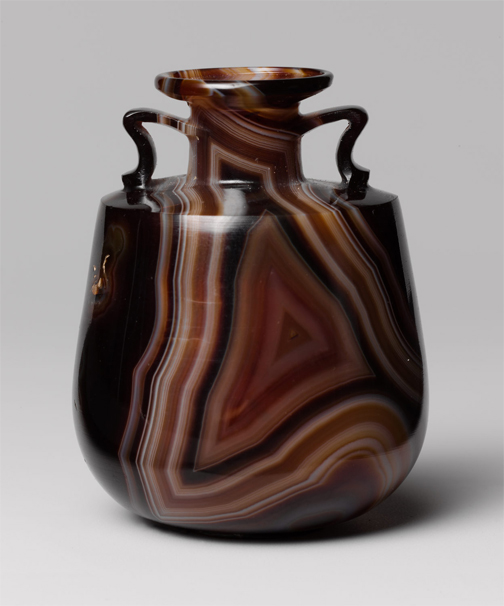
Dead Flies
| “Dead flies putrefy the perfumer’s ointment, and cause it to give off a foul odor.” |
| —Ecclesiastes 10:1 NKJV |
Something ruined! And, it was something with such an intentional, pleasure-causing purpose as an expensive perfume. Now it’s ruined! And, by what? A stray fly coming through the palace window into the boudoir of a wealthy maiden. The perfume—created with such skill by a talented expert artisan, skilled in the art and science of perfumery—totally spoiled by the ugly presence of a filthy, common fly.
When compared to the witness of a fine Christian, we are reminded that even this witness can be spoiled by the entrance of a foul, habitual sin. I appreciate the way that Charles Haddon Spurgeon describes it:
No matter though the vase be alabaster, and the perfume the most delicate, dead flies would destroy the precious nard, and even so minor faults will spoil a fine character. Rudeness, irritability, levity, parsimony [stinginess], egotism, and a thousand other injurious flies have often turned the exquisite perfume of a Christian’s life into a pestilent odor to those who were around him. 1
In comparison, the Apostle Paul, in 2 Corinthians 2:14-15, expresses God’s intent for us to live in such a way so that those around us effectively “smell” the sweet aroma of Christ. The Apostle offers this declaration:
But thanks be to God, who always leads us in triumphal procession in Christ and through us spreads everywhere the fragrance of the knowledge of him. For we are to God the aroma of Christ among those who are perishing.
God’s intention for us—to live in such a way that we spread His Presence like a fine perfume—can be ruined by the entrance of our sinful sloppiness, as though we left the lid off the bottle of perfume and flies entered, ruining the liquid. We can only remedy our sin by coming to Him with confession and repentance, so that we may receive His forgiveness and His restoration, thus giving us a new start under the power of His Holy Spirit.
During this time of Lent, let us examine our lives for those “dead flies” that mix in the stench of sin with the life-giving perfume of Christ that He created us to exhibit. May He spread abroad His love through the fragrance of our lives, purified by His precious blood.
______________________
| 1 Spurgeon, Charles Haddon. Spurgeon’s Devotional Bible. Grand Rapids: Baker Book House, 1964. p. 325. |
—Posted: Monday, March 11, 2024
_______________

Become the Bridge
| “Praise be to the Lord, to God our Savior, who daily bears our burdens.” |
| —Psalm 68:19 |
| “Carry each other’s burdens, and in this way you will fulfill the law of Christ.” |
| —Galatians 6:2 |
Did you ever stop to think what our lives would be like without bridges? People who live near rivers, or swamp land, would have a nearly impossible time getting to work or getting to common shopping areas without bridges. We can all be grateful for the continual burdens bridges carry to allow us ease in our daily lives.
Have you ever been a “bridge” for another person? As such, you became their help in traversing a tough spot in life, or helped them move on to the other side of a difficulty? The Simon and Garfunkel lyrics from the 1960’s come to mind:
When you’re weary, feeling small
When tears are in your eyes, I’ll dry them all (all)
I’m on your side, oh, when times get rough
And friends just can’t be found
Like a bridge over troubled water
I will lay me down
Like a bridge over troubled water
I will lay me down. 1
Certainly, if people without an eye to pleasing our Savior can think that way about their friends, how much more should we—who have the example of a God who bears us through this life, and of a Savior who bridged the gap on the cross for our sins—act as a willing bridge for those who need us to help carry them to wholeness?
Sometimes it even becomes necessary to act as a “covered bridge” for others: protecting them from more winds of adversity and from the cruel and bitter sting of sin and shame. Such people need the hospitality and healing of a safe and guarded place. And, from time to time, God calls us to offer this solace to His hurting children.
Jesus told us in John 15:13:
“Greater love has no one than this, that he lay down his life for his friends.”
The next time you drive over an expansive bridge, or see a covered bridge, remind yourself that just as we sometimes need bridges to arrive at our next destination, so Christ may have need for us to become a bridge for someone else on their journey through life!
______________________
| 1 Simon, Paul. “Bridge Over Troubled Waters.” ©1969. All Rights Reserved. These lyrics remain the sole property of the copyright owners. Included here under the “Nonprofit Educational Use Provision” of Section 107 (2022 Edition) of the United States Code, 2018 Edition, Supplement 4, Title 17 - COPYRIGHTS. |
—Posted: Monday, March 4, 2024
_______________
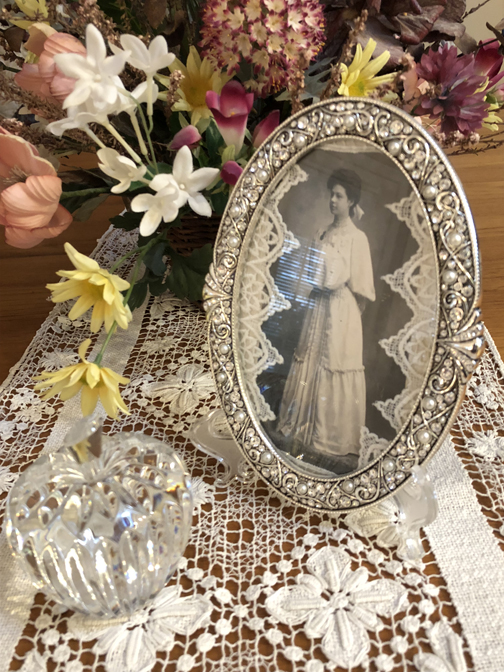
Hidden Treasures
| “Do not store up for yourselves treasures on earth, where moth and rust destroy, and where thieves break in and steal. But store up for yourselves treasures in heaven, where moth and rust do not destroy, and where thieves do not break in and steal. For where your treasure is, there your heart will be also.” |
| —Matthew 6:19-21 |
I have a beautiful photograph of my maternal grandmother as a teenager. What a treasure! I also have a Waterford crystal apple given to me by my music colleagues on the occasion of my retirement from teaching. Again, what a treasure! Once in awhile I take the opportunity to look at my various pieces of furniture, jewelry, dishes, photographs, and paintings that I consider true treasures and I marvel at these “things” that God has so graciously given me.
I don’t think Jesus was opposed to earthly treasures. But instead, He wants us to put them into proper perspective and use them as an illustration of the greater things He wants us to value. Even more than the way we take out our keepsakes and admire them, I believe He wants us to set aside the time, once in awhile, to admire the eternal treasures He gives us. Is there a better opportunity than during the Season of Lent for us to do just that?
Do you have familiar passages of Scripture that you memorized a long time ago, or learned as a child, but which have slipped into the background of your thinking? Why not take those Scripture passages out, dust them off, and reclaim them? For example, how long has it been since you have read and meditated on Psalm 23? Or, perhaps the Lord spoke to you and changed you through some other passage of Scripture that you haven’t looked at in some time. Take the time during the Season of Lent to read that passage in another translation, to study it verse by verse, word by word. If you do so, I believe you will discover that a treasure awaits you!
Another source, in my personal “glass case of memories,” comes through the hymns and spiritual songs that I have sung over and over throughout my lifetime. These hymns hold treasured phrases and living images of God’s truths. To review them brings me renewed blessing, challenges, gratitude, and love for my Lord.
If you journal your spiritual progress, like I do, the things that God teaches us daily, in our quiet time with Him, reveal a fortune of riches. I encourage you to join me in taking a look back through our journal entries. See how He has blessed us through the day-to-day revelation of His presence. The times He has met with us, answered prayer, and taught us about life with Him should truly make us rejoice in the treasures He has given to us.
So, I am suggesting that we all pull out the treasures we have stored in our hearts—treasures of Scriptures and spiritual songs, treasures of the day-to-day remembrances of His presence. We need to slowly turn them over in our minds and hearts, admiring the prized truths that bring our Savior closer and help us adore Him, the greatest Treasure of them all!
—Posted: Monday, February 26, 2024
_______________
![[Painting of a lamb and the cross]](https://www.rpcerie.org/images/behold_the_Lamb.jpg)
Behold the Lamb!
| The next day John saw Jesus coming toward him and said, “Behold, the Lamb of God, who takes away the sin of the world!” |
| —John 1:29 |
References to Jesus as “the Lamb of God,” come up often in the New Testament Scriptures—from His baptism by John, all the way to Revelation, the last book of the Bible. Most often the image of the Lamb refers to Christ’s sacrifice on the cross and His disposition as He made that sacrifice.
The challenge for us, who follow the Lamb during this Season of Lent, comes when we humbly acknowledge how far we fall from His standard.
The British evangelist and author, Roy Hession, refers to an address he heard in London in the 1940’s by a Mr. Marshall Shallis, who spoke of Jesus as:1
- The simple Lamb—helpless and dependent.
- The shorn Lamb—of His rights, His reputation, His position.
- The silent Lamb—never defending Himself or explaining Himself.
- The spotless Lamb—no resentment, no grudges, no bitterness.
- The substitute Lamb—carrying our sins, the scapegoat for us, scarred and humble.
If we make it our goal to be like Jesus, we need to consider how the Holy Spirit continually urges us to allow Him to accomplish more of these characteristics of the Lamb in us. We should accept the challenge during this Season of Lent to join in meditating on the love that led Jesus to become the Lamb for us. Then, let us listen as the Holy Spirit urges us to ask what qualities He would like to see blossom in our lives.
______________________
| 1 Hession, Roy, The Calvary Road. London: Christian Literature Crusade, 1950. Pp. 60-64. |
—Posted: Monday, February 19, 2024
_______________
![[Photo of a Welcome mat at a doorway]](https://www.rpcerie.org/images/welcome_mat.jpg)
Welcome
| “Come unto me, all ye that labour and are heavy laden, and I will give you rest.” |
| —Matthew 11:28 KJV |
I know that plenty of children do not find their fathers approachable—especially when connecting with their dads means reporting on some bad news. Having borne the brunt of numerous angry, abusive responses, they shy away from intimate relationships with their fathers.
This phenomenon is not limited to childhood. Even approaching people with whom we work, or with whom we volunteer, or to whom we are related can produce the same kind of reticence. If the individuals we intend to approach have rebuffed us in the past, we may stew a bit before we try to connect with them. I think of two Bible stories that clearly demonstrate this kind of fear:
- In certain chapters of Scripture—Genesis 27 - 33—we read the stories of Jacob and his first-born brother Esau. Due to Jacob’s deceptions, he received the blessing of his father instead of Esau. This resulted in anger and hatred from Esau and a plan to kill his brother. Jacob eventually moved to Hiran, to get away from his brother and with the intent of finding a wife.
After leaving Hiran many years later, richer and blessed with sons and daughters, he struggled when he considered whether or not to arrange a meeting with Esau again after all the intervening years. Jacob prayed and wrestled with God all night before the confrontation with Esau the next day.
God heard his prayers and Esau greeted Jacob with a warm welcome. However, because Jacob feared that his brother would seem unapproachable, Jacob suffered great fear of that meeting. - As recorded in the Book of Esther, the queen feared the king because of the edict he had issued that no one could come into his presence without his invitation. Anyone violating this decree would be killed. But, Queen Esther had agreed to approach the king on behalf of her people, the Jews. So, Queen Esther prayed and fasted, asking God to preserve her as she approached the king. God heard and answered her prayers.
Our God does not treat us in such a way that we need to fear coming to Him with our requests. A. W. Tozer writes: 1
God never changes moods or cools off in His affections or loses enthusiasm. His attitude toward sin is now the same as it was when He drove out the sinful man from the eastward garden, and His attitude toward the sinner the same as when He stretched forth His hands and cried, “Come unto me.” … He is always receptive to misery and need, as well as to love and faith. He does not keep office hours nor set aside periods when He will see no one.
When it comes to approaching God in our times of need, His open arms will always greet us. Yes, He welcomes us, just as various Scripture records that He did in both Old Testament times and in New Testament times—as He welcomed the beggars and the sick, and as He welcomed the children in Mark 10:13-16.
We must never consider that we are interrupting God to come to Him. We must never consider that our needs are too small for Him to meet. Instead, we must accept His gracious welcome and know that He never changes.
______________________
| 1 Tozer, A. W. The Knowledge of the Holy. New York: HarperCollins Publishers, 1961. p. 53. |
—Posted: Monday, February 12, 2024
_______________
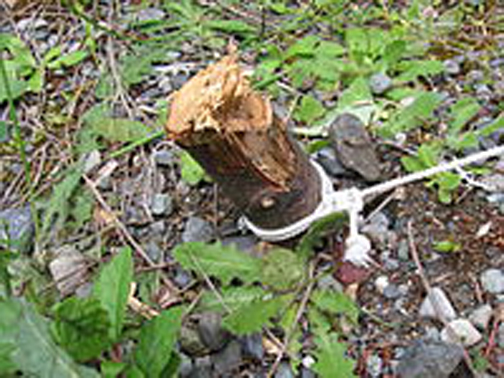
Our Tent Peg
| “From Judah will come the cornerstone, from him the tent peg.” |
| —Zechariah 10:4 |
The nation of Israel certainly knew about tent pegs. In their forty years of wandering the desert, and until the “permanent” temple in Jerusalem was built, they worshipped in a large tent or tabernacle, which from time to time they had to pick up and move to a different location in the desert.
In the Book of Exodus, we read that these tent pegs were crafted of bronze. They were mentioned throughout that Book and into the Book of Numbers. These tent pegs had a significant purpose in maintaining the stability of the tabernacle.
We all have our “tent pegs.” Our tent pegs“tent pegs” consist of those things we have crafted, or more likely received as a gift of God’s grace, that help us feel stable in the unfolding of our daily lives.
As a child, I felt secure because I had loving Christian parents and large Christian extended family. I lived in the same house until I left for college. I went to the same church, to the same school, and so forth, all through those years.
As an adult, I may not think I rely so heavily anymore on “earthly” tent pegs, but I guess that I do. I get stability from my home, my husband, my family, my church, my friends, and from even more.
Furthermore, each of us has likely suffered loss of something we have relied upon as a “tent peg.” The circumstances of our lives have caused us to lose something or someone we held dear that provided stability in our lives.
Even as God did with the Israelites, He sometimes asks us to pull up our tent pegs because He has a new venture for us. We may be thrust into a new situation that feels so different and unstable to us. Yet, God wants to show us that He is the unchangeable “tent peg” of our lives—the One on whom we need to rely. He provides the rock-solid stability upon which we need to depend.
Though the Psalmist used somewhat different images, in Psalm 46:1-7 we read the similar sentiment:
God is our refuge and strength, an ever-present help in trouble. Therefore, we will not fear, though the earth gives way and the mountains fall into the heart of the sea, though its waters roar and foam and the mountains quake with their surging.
There is a river whose streams make glad the city of God, the holy place where the Most High dwells. God is within her, she will not fall; God will help her at break of day.
Nations are in uproar, kingdoms fall; he lifts his voice, the earth melts. The Lord Almighty is with us; the God of Jacob is our fortress.
Whether we want to think of God as a refuge and a fortress in the storm when everything falls around us, or the stable “tent peg” who keeps the tent of our lives upright and stable, we do our best when we consciously and consistently rely on Him, rather than on any earthly tent pegs, of which we tend to expect too much.
—Posted: Monday, February 5, 2024
_______________

Priorities
| “But seek first his kingdom and his righteousness, and all these things will be given to you as well.” |
| —Matthew 6:33 |
With what do you concern yourself the most? I can honestly say that I spend most of my thoughts on those things that I can do nothing about except to pray. Jesus knew we tend to suffer the most over things that would actually take a miracle of His grace to resolve.
In His Sermon of the Mount, Jesus used as His illustration the worries about food and clothing—something we would all commonly worry about, if we didn’t have them. But, rather than telling His disciples to pray about those things, or giving them solutions to the potential problems the lack of those things might present, He tells them—and us—to put our minds first on the requirements of His Kingdom and also on the righteousness He expects of us.
Sometimes, in order to get our lives straightened around after a deeply embedded sin and its consequences, we think most about the consequences. Instead, Jesus turns this idea on its head and tells us to first take care of the sin problem. He is the very embodiment of righteousness. And, He has graciously made a way, through His death on the cross, to make us righteous, too. He speaks peace with the words, “I will take care of the other problems.”
Do we put His Kingdom first? Are we anxious about living righteously throughout each new day of the year 2024, at the beginning of every new venture, and particularly whenever we are faced with new or old troubles?
I was interested to see that in James 5:13-16, where the Apostle teaches us about praying for a sick member of a congregation, he admonishes those praying to confess their sins one to another. Would we consider that important when a man’s or woman’s life hangs in the balance? Certainly God does.
As we continue into the year 2024, whatever worries we may have, if we start by first dedicating ourselves to the work of His Kingdom and His righteous requirements for our lives, we can remain assured that God has the power to act in our behalf. I love the way that Charles Spurgeon addresses the verse at the beginning of this blog post: 1
What a promise this is! Food, raiment, home, and so forth, God undertakes to add to you while you seek Him. You mind His business, and He will mind yours. If you want paper and string, you get them given in when you buy more important goods; and just so all that we need of earthly things we shall have thrown in with the kingdom.
______________________
| 1 Spurgeon, Charles H. Faith’s Checkbook. Chicago: Moody Press, 1980. p. 150. |
—Posted: Monday, January 29, 2024
_______________

A Spoonful of Sugar
| “For men are not cast off by the Lord forever. Though he brings grief, he will show compassion, so great is his unfailing love. For he does not willingly bring affliction or grief to the children of men.” |
| —Lamentations 3:31-33 |
You have undoubtedly seen the Disney character, Mary Poppins, in the movie with that name, trying to get the Banks children to clean the messy nursery. She finally sings a song to them with the lyrics: “A spoonful of sugar makes the medicine go down.”
An account records 1 that after an unsuccessful struggle to come up with a song for the movie, lyricist Robert Sherman went home one evening to find that his children had just taken the Sabin polio vaccine. In asking if it hurt, his son explained that he had felt no pain because the nurse had given him the vaccine on a tiny sugar cube. This gave Sherman the inspiration he needed for the lyrics to the now-famous song.
When we suffer various problems and afflictions in our lives, I truly believe that God devises all kinds of “sugar” for us, His dearly loved children. Though our troubles may cause us great pain and anguish, God consistently sends His grace to help us bear the suffering. Our God pours into us as much—or even more—mercy, even as He may pour into us His discipline.
When I read the Old Testament Book of Judges, it always amazes me. Over and over again, God gives Israel a judge with His special Word for them to follow. Once the judge dies, they begin to increase their sin and things go awry again.
The author of the Book of Judges records the length of time the children of Israel have to deal with their disobedience. Then, God calls another judge. Each time, I read the words, “So the land had peace for ?? years,” I take particular note that the years of peace always exceed the years that they suffered war and turmoil. 2
As we look back over the years of our lives, and as we move forward into the future, we must search for the very evident signs of the grace that God sends us during our trials. We then must write the instances of His grace down in some form that we can later review and remember. This little exercise will encourage us to see that God really does care, that He walks with us, and that He gives us gifts beyond our imagination to help us through the pain.
The Puritan writer, Thomas Watson, says it this way: 3
He [God] will not over-afflict. He mixes mercy with all our afflictions. If he gives us wormwood to drink, he will mix it with honey. In every cloud a child of God may see a rainbow of mercy shining.
______________________
| 1 Sherman, Robert. A Spoonful of Sugar Online Disney Wiki. |
| 2 For example: Judges 3:11, 3:30, 5:31, and 8:28 |
| 3 Watson, Thomas, as quoted in Rushing, Richard, editor. Voices. Carlisle, PA: The Banner of Truth Trust, 2009. p. 228. |
—Posted: Monday, January 22, 2024
_______________

All Things Hold Together
| “He is before all things, and in him all things hold together.” |
| —Colossians 1:17 |
God has gifted some people with the ability to put things together well and to even maintain them in proper working order. For me, things rarely work as I envision them. And, they certainly would not hold together through years of use and possible misuse.
Do you ever wonder how God keeps the runners’ legs from falling off in an Olympic race? Or, how He keeps a person’s heart from exploding, when he or she gets overly excited? What about the way He can keep a child’s “feet on the ground” at Christmas time? The Scripture verse at the beginning of this blog post tells us that not only does God create everything, He also holds all things together!
At this time every school year, I used to teach the song, “He’s Got the Whole World in His Hands.” I did so because history tells us that Dr. Martin Luther King, Jr. loved this particular spiritual. The song also certainly touches on the sovereign power of our God in holding everything in our world together.
Sometimes it feels like our personal “world” will surely blow apart. In response to such feelings, God speaks through the Psalmist Asaph in Psalm 75:3 and tells us:
“When the earth and all its people quake, it is I who hold its pillars firm.”
Ahh! What an assurance that verse brings. We can likewise say:
“When my world quakes, it is God who holds its pillars firm.”
We should say that sentence over and over, until we realize that the Sovereign Lord holds us in His hands! Because He does so, we will not fall apart.
—Posted: Monday, January 15, 2024
_______________
![[Photo of the measuring of the circumference of a baby's head]](https://www.rpcerie.org/images/infinite.jpg)
Infinite
| “Oh, the depth of the riches of the wisdom and knowledge of God! How unsearchable his judgments, and his paths beyond tracing out!” |
| —Romans 11:33 |
We humans get stuck on measurements. We describe our world that way. We compare and make sense of things with numbers. From the measuring rod and the scale or tape measure in the delivery room to our obsession with our weight and an obituary giving our age at death, we describe and understand ourselves by the numbers.
Yet, numbers alone do not apply to God. In fact, He simply cannot be measured. He is limitless in His being, in His power, in His understanding, and in His love. I like the way that A. W. Tozer explains it: 1
Is it not plain that all this [measurement] does not and cannot apply to God? It is the way we see the works of His hands, but not the way we see Him. He is above all this, outside of it, beyond it. Our concepts of measurement embrace mountains and men, atoms and stars, gravity, energy, numbers, speed, but never God.
We cannot speak of measure or amount or size or weight and at the same time be speaking of God, for these tell of degrees and there are no degrees in God. All that He is, He is without growth or addition or development. Nothing in God is less or more, or large or small. He is what He is in Himself, without qualifying thought or word. He is simply God.
This understanding of our God, calls for worship of Him and a renewal of our faith. The One who has called us to Himself can capably care for us. He can see us, understand us, have compassion for us, and send help to us when we have no stores of our own.
Like those gathered at Cana, we may be out of wine at a wedding. But, with Him in the room, we have all the resources we need to fulfill our responsibilities. (See the Parable in John 2:1-11.)
______________________
| 1 Tozer, A. W. The Knowledge of the Holy. New York, NY: Harper Collins Publishers, 1961. Pp. 45-46. |
—Posted: Monday, January 8, 2024
_______________
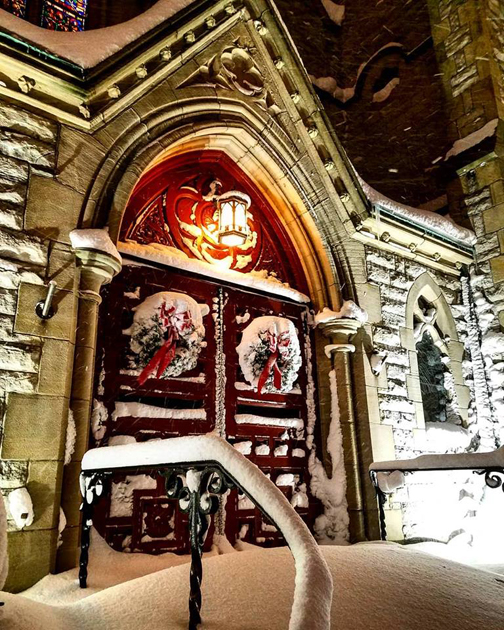
Janus
| “The Lord will watch over your coming and going both now and forevermore.” |
| —Psalm 121:8 |
The name for the month of January comes from the name of Janus, the Roman god of doorways. This god had two faces: one looking forward and one looking backwards. As we step over the threshold into this new year, we certainly have a better view of the year behind us than we do of the one ahead.
We constantly read in the Psalms that we are to consider the Lord’s works and, by doing so, see all that He has done. This good advice is illustrated many times in Scripture.
In a story recorded in 1 Samuel 7, Samuel met with the Israelites at Mizpah to confess their sins and cry out to God for deliverance from the Philistines. Here Samuel took a stone and set it up, naming it “Ebenezer,” saying, “Thus far has the Lord helped us.”
At this threshold of a new year, we should look back long enough to see how the Lord has helped us through the year just past. I like to make a list of the high points of each year. Then, I take note of how impossible it would have been to meet the challenges and enjoy the blessings without the direct intervention of our Lord.
Looking forward into the new year presents a bit of a harder task. And, lest we get into too much daydreaming, as I often do, let me warn each of us about the dangers that forward thinking often presents. We cannot possibly know what lies ahead of us in the new year. As much as we would like to plan it out, we don’t have that luxury. We need to remember that God controls our future. We do not.
Nevertheless, we do need to consciously and volitionally trust God with what lies ahead. We often will not know what the next day will bring. Yet, we should not live in fear, or presume life will always work out according to our careful plans. If we belong to the Sovereign God, we know that we can rely on His wisdom to guide us and His love to watch over us.
I pray that we will know more about how to live our lives by following the way of trust, to live in peace with our future, even while we do not know what this new year will bring. We can depend on the One who knows every day before we get to it, and we can fully trust the One who will bring light to the pathways of our lives. As the Psalmist has committed himself, recorded in Psalm 119:105-106, let us also say:
Your word is a lamp to my feet and a light for my path. I have taken an oath and confirmed it, that I will follow your righteous laws.
______________________
| 1 Note: The photo at the top of this devotional of The Cathedral of St. Paul, Erie, Pennsylvania, was taken by photographer, Pat Bywater, December 26, 2017. |
—Posted: January 1, 2023



